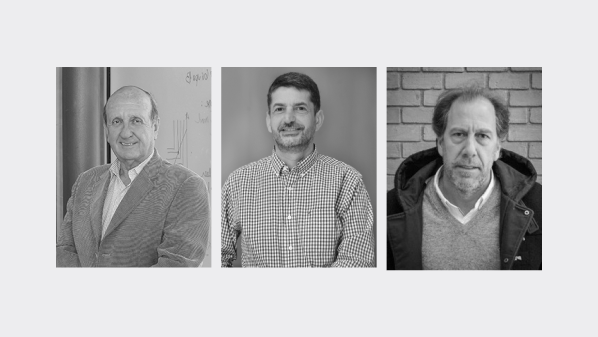
The Experts Panel - which regulates public transportation fares in Santiago - announces a package of changes. The measures lowered the cost of tickets during non peak hours, but raised the cost of tickets during peak hour, leaving the cost of one trip at 830 Chilean pesos ($1.17 USD).
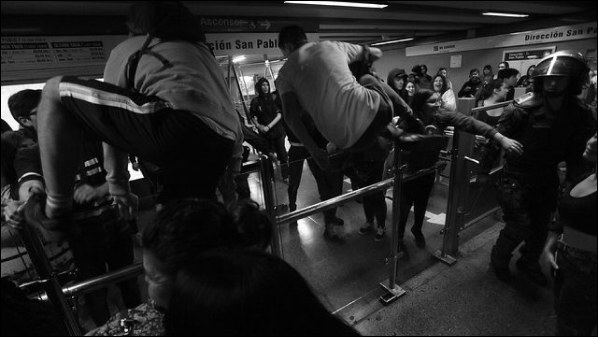
National Institute students organize the first day of massive public transportation payment evasion, replicating the same action every day at different subway stations.
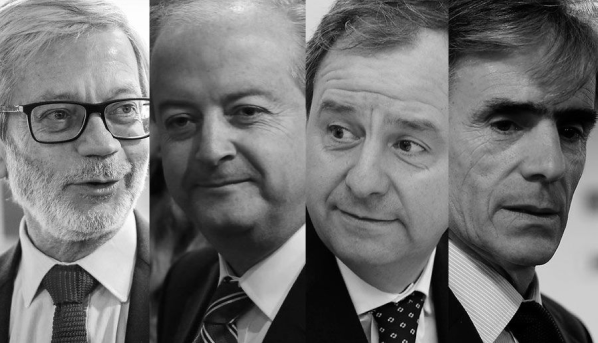
Minister of Economy, Juan Andrés Fontaine, says when asked about the raise: “The early riser will be helped with a lower rate”. See more
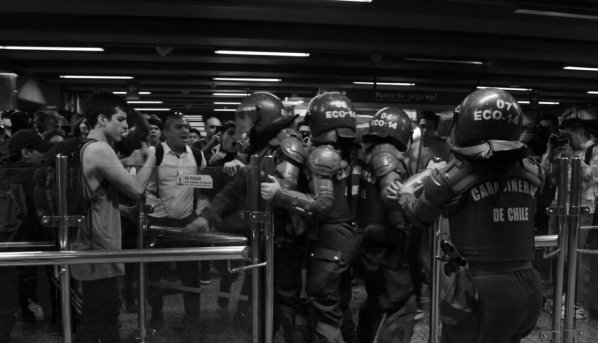
Around 1pm the first massive payment evasions happen along subway’s Line 1. The state company replies with a preventive closing of Pedro de Valdivia station, and then extends it to Line 5 stations. See more
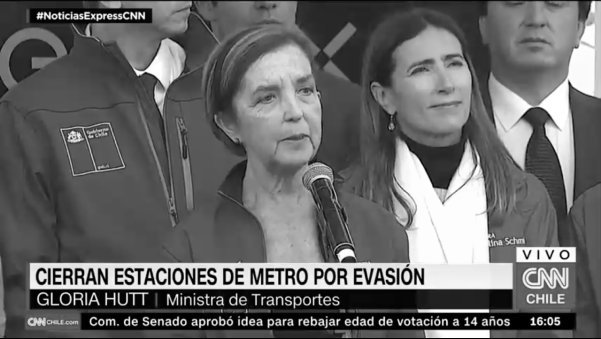
Facing the call to mass payment evasion, the Minister of Transportation, Gloria Hutt, says that “students have no argument”, because the raise doesn’t affect student fares.
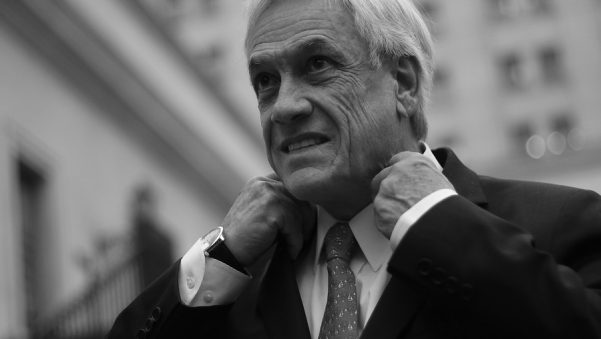
The President, Sebastián Piñera, affirms that “we all have the right to express and protest, but nobody has the right to do it outside of the law (...) When that is not respected, an attempt is being made again everyone else’s freedom”.
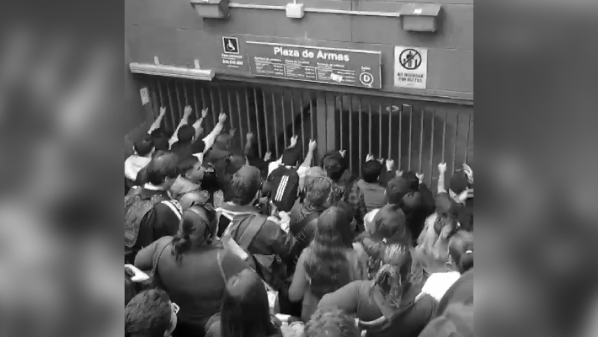
Protesters shoot down, for the first time and in Plaza de Armas (main downtown square), the metallic fence that impeded access to the subway station.
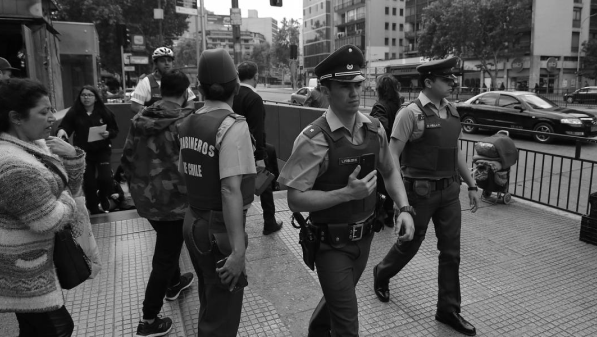
Metro, the state company operating the subway system in Santiago, decides to not stop in the stations where demonstrations or massive evasions are taking place.
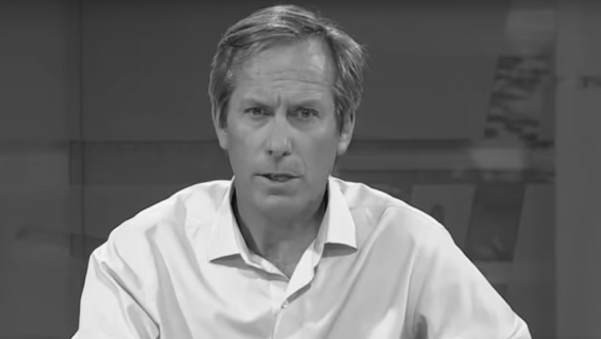
Clemente Pérez, former president of Metro’s Directory Board, is interviewed about massive evasions and says: “Guys, this didn’t catch on. It didn’t. You’re not cool, people are not backing you. Not even on Twitter, where you usually see these kinds of movements having more traction, you see that much traction. Really, people’s heads are somewhere else.”
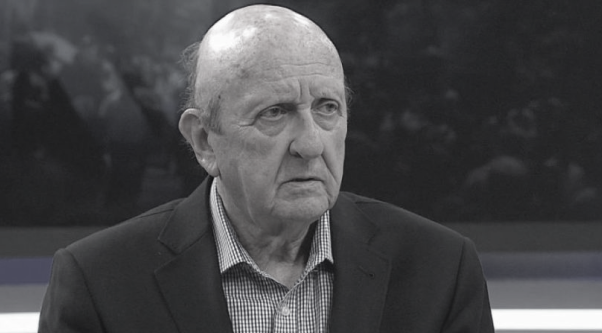
Juan Enrique Coeymans, president of the Experts Panel which sets subway tickets’ fares, affirms: “When tomatoes prices rise, bread, everything, there is no protest”.
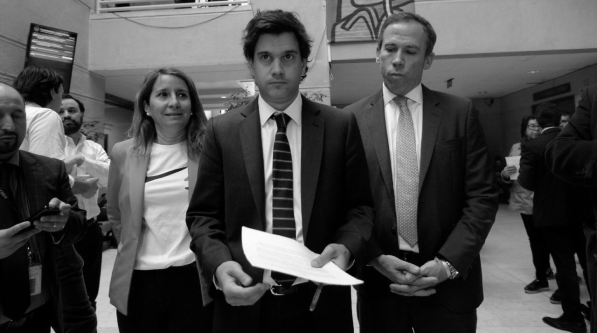
Renovación Nacional (Chilean political party) representatives Sebastián Torrealba and Karin Luck, reply to the situation presenting a bill that sanctions with criminal penalties those who evade public transportation payment.
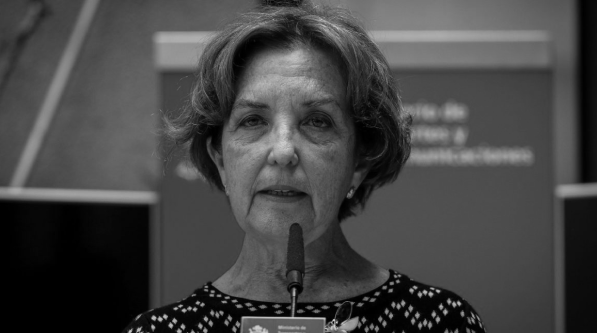
Minister Hutt discards lowering fares: “A decision has already been made and established”.
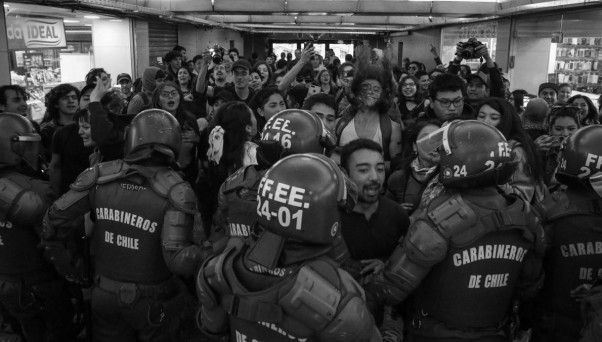
Massive payment evasion increases in multiple subway stations. Strong police repression.
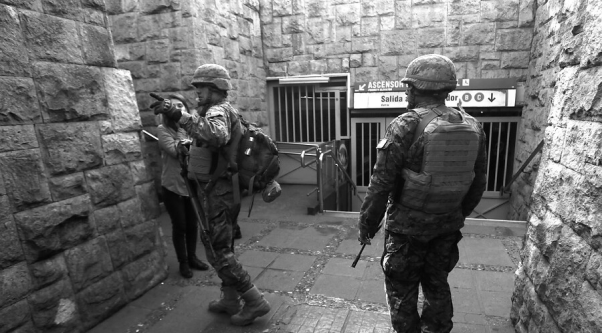
All subway stations are indefinitely closed.
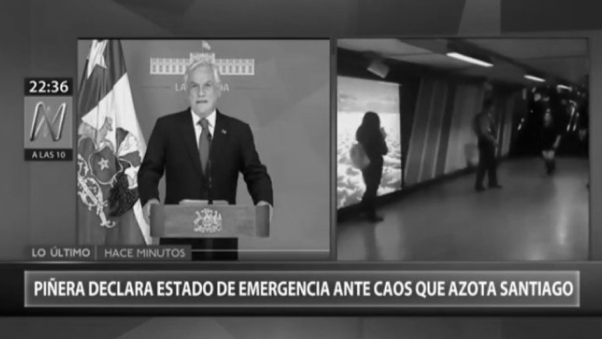
State of Emergency is declared, allowing the presence of military forces on the streets to control public order for the first time since the military dictatorship.
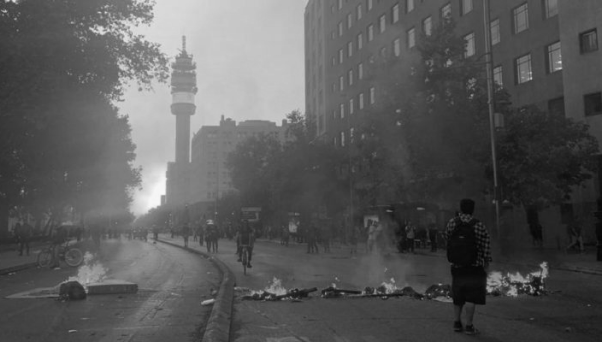
Protests are repressed and turn violent, numerous barricades appeared in the city.
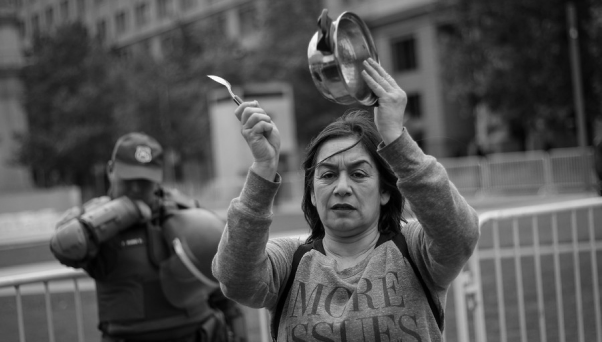
Cacerolazos (saucepan banging) and citizen protests don’t stop, now patrolled and repressed by military forces.
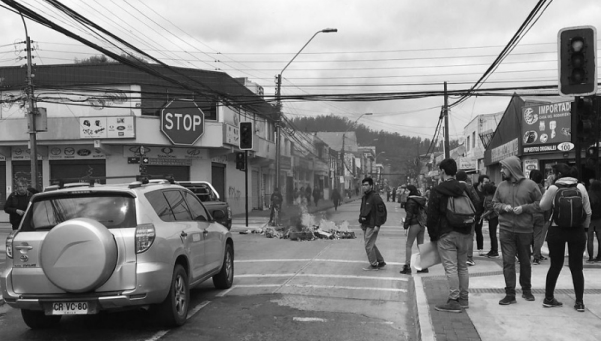
Citizens from outside the Metropolitan area, in the other regions of the country, state that they will continue with protests.
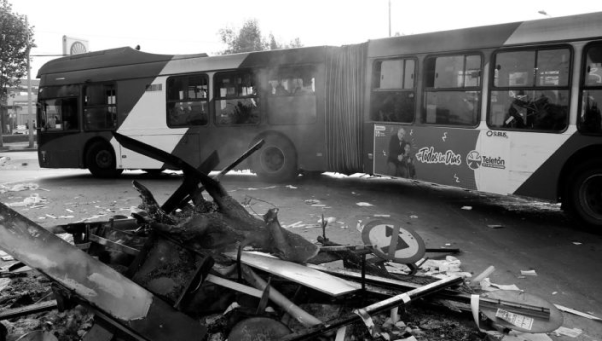
Terrestrial public transportation service (buses) is suspended.
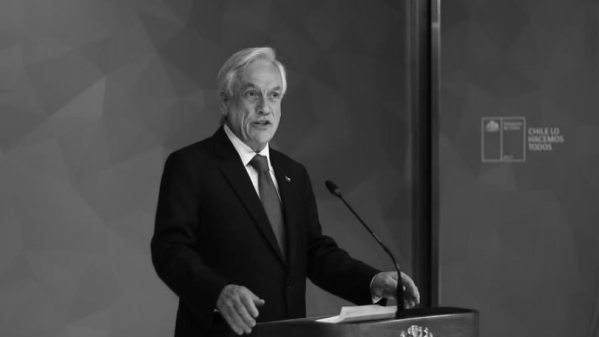
President Piñera announces that the raise in the subway fare will be reverted.
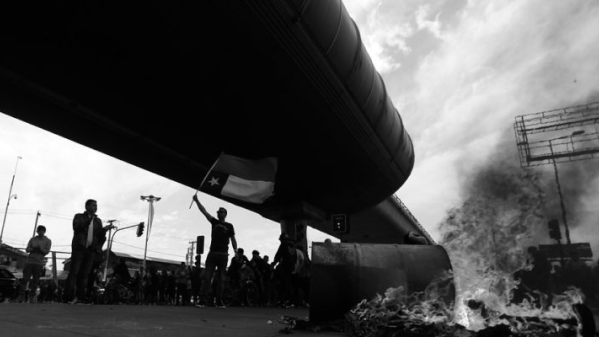
Despite government’s announcement, incidents continue and subway station are burnt.
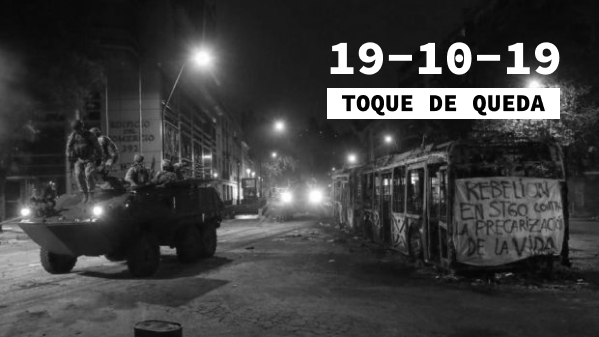
Curfew is declared between 10pm and 7am.
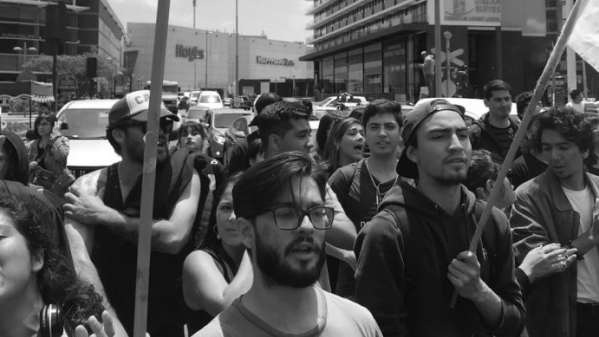
Protests expand to other cities in the country, riots increase. There are damages to businesses, public buildings, monuments and churches.
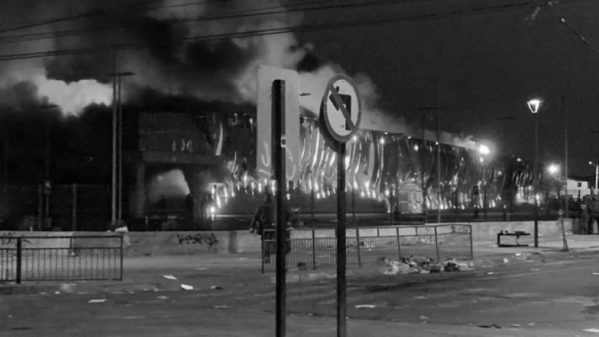
Two women die in a fire in a supermarket in the San Bernardo area.
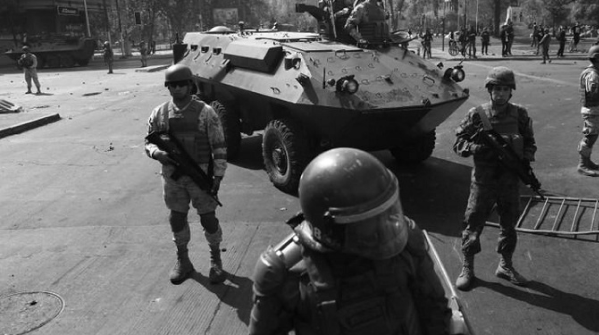
Military forces are still on the streets.
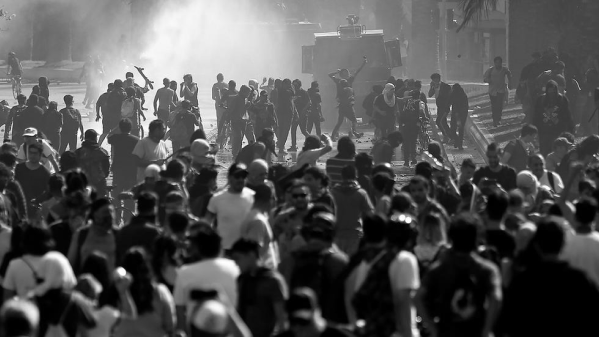
Protests continue in the country.
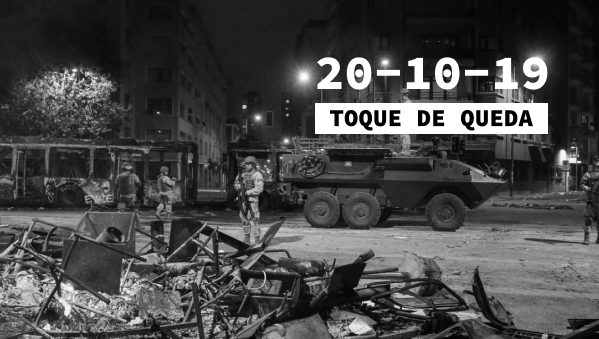
A second curfew is ordained, this time between 7pm and 6am.
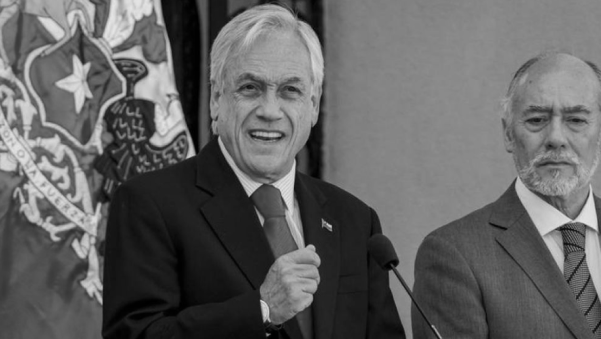
“We are at war against a powerful enemy”: President Sebastián Piñera declares Chile at war against an internal enemy he doesn’t define: “We are very conscious that they (protesters) have a degree of organization and logistic that is characteristic of a criminal organization”. State of Emergency is expanded to 11 regions.
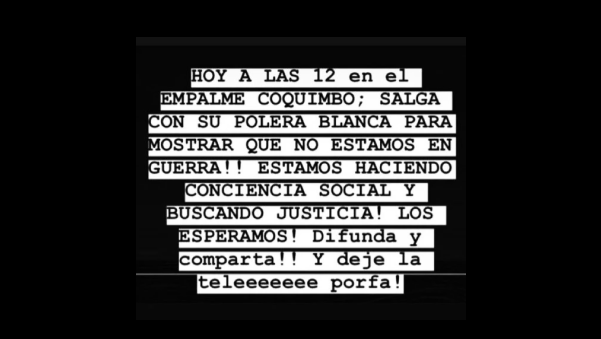
Citizens reply on social media and at protests with the phrase: “We are not at war”, and demand that the government proves the existence of a supposed criminal organization.
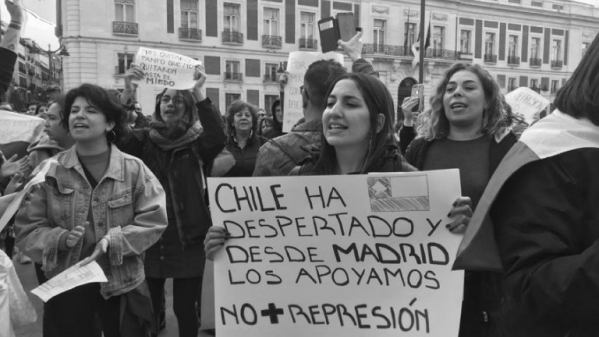
All around the world there are pacific demonstrations of solidarity with Chile.
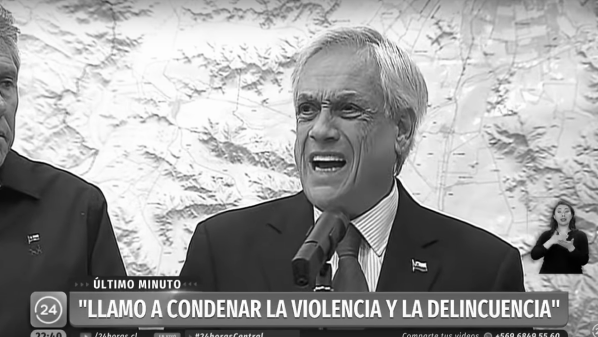
Chilean President Sebastián Piñera addresses the country again by television. He keeps a discourse focused on crime. He avoids talking about specific measures, and summons all political parties’ presidents for a meeting.
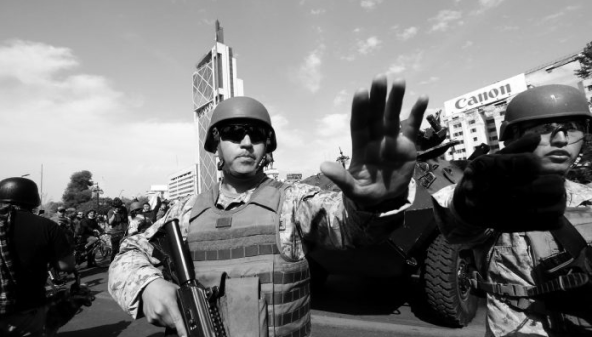
Military forces are still on the streets.
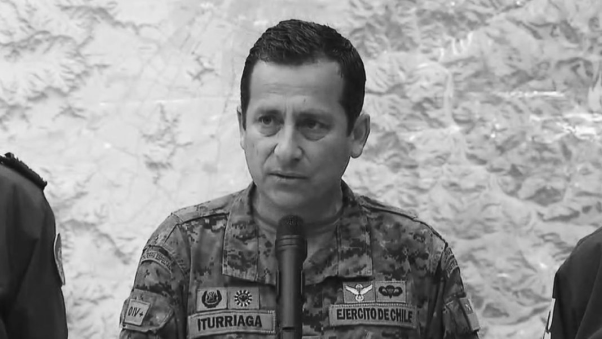
General Iturriaga -in command of the State of Emergency- declares: “I’m a happy men, I’m not at war with anynone”.
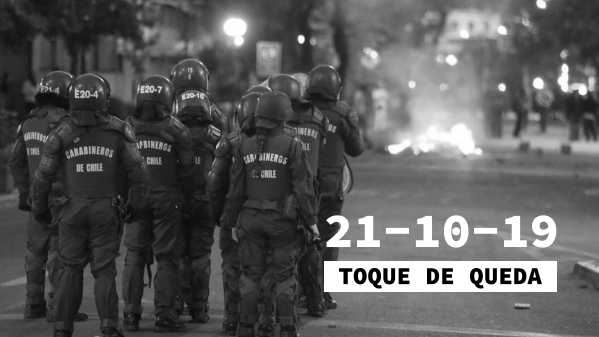
Third curfew.
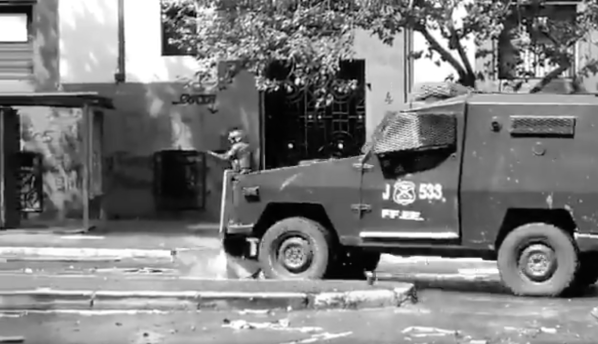
Pacific protesters are suppressed with violence all around Chile. Videos show soldiers shooting protesters in Las Condes and threatening them with tankettes.
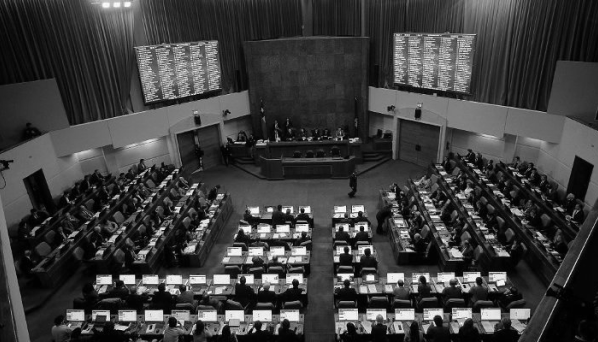
After quickly passing a law in Congress, the raise of fares in the public transport system is eliminated. This does not seem to have any effect on social discontentment.
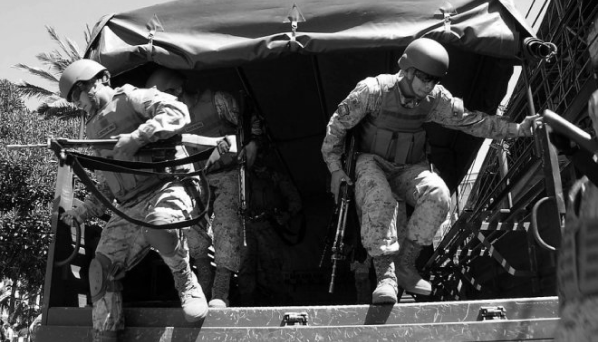
Manuel Alejandro Rebolledo Navarrete, 22 years old, dies after being ran over by a military truck close to Talcahuano. See more
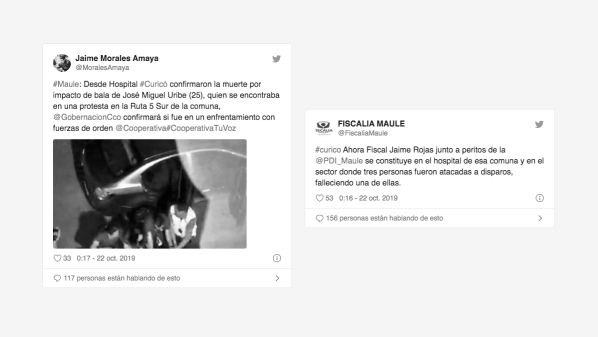
In Curicó, not included in the State of Emergency, a soldier killed José Miguel Uribe Antipani, 25 years old. Said soldier is now under detainment. See more
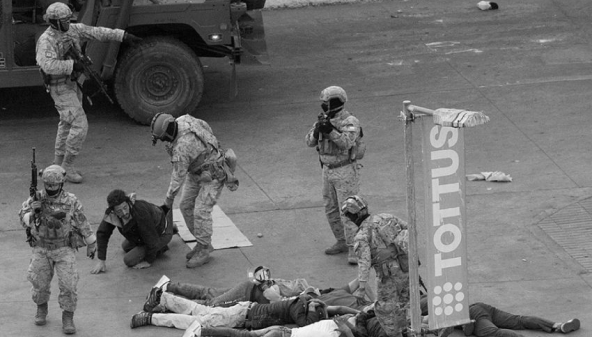
At least 15 people have been confirmed dead since protests started.
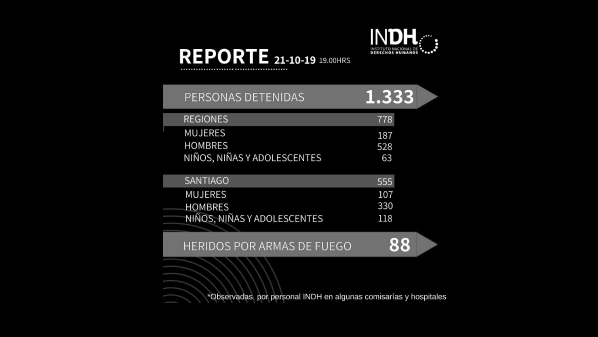
Almost 1.000 detainees are reported and graves human rights violations, sexual abuse, and torture.
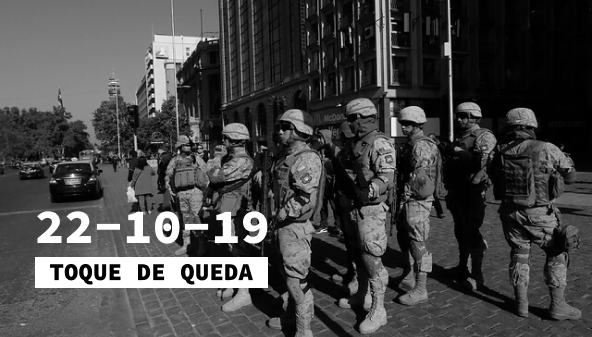
The fourth night of curfew.
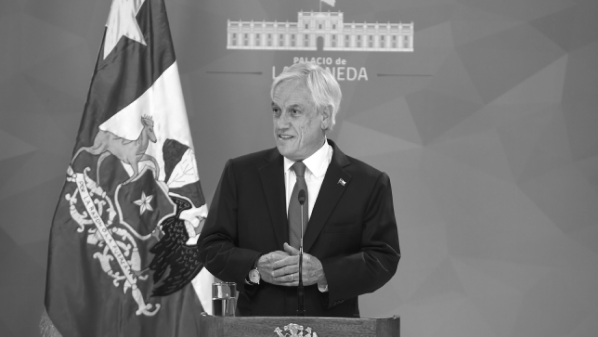
President Sebastián Piñera announced the approval of a social agenda that envisions measures such as an increase in supportive pensions up to 20% (roughly $22,000), increase of minimum wage to $350,000, higher taxes for those who have monthly rents over 8 million pesos, suspension of the light bills increase, among others. See more
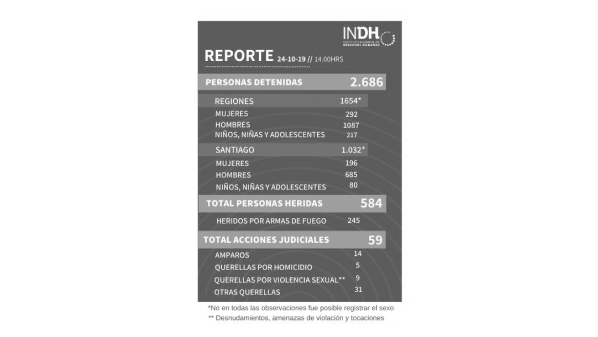
The Human Rights National Institute confirms 5 deaths and 137 wounded by State agents
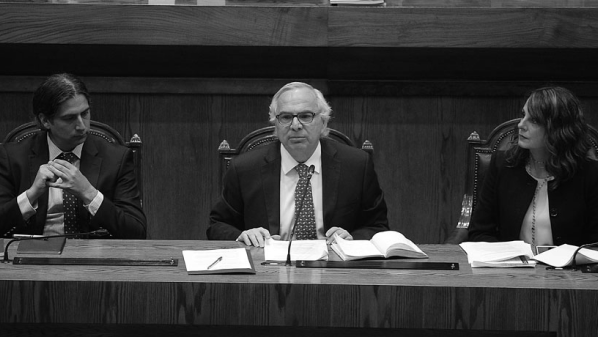
After attending a section at Chamber of Deputies, Minister of the Interior Andrés Chadwick denies political responsibility over the human rights violations that have occurred during the past days.
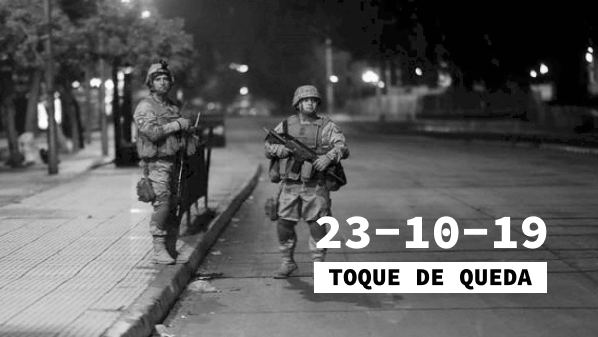
The fifth night of curfew is announced, this time in the Valparaíso and Metropolitan regions, Concepción Province, and the cities of La Serena, Coquimbo, Arica, Antofagasta, Calama, Tocopilla, Mejillones, Iquique, Alto Hospicio, Rancagua, Talca, Valdivia, Puerto Montt and Osorno.
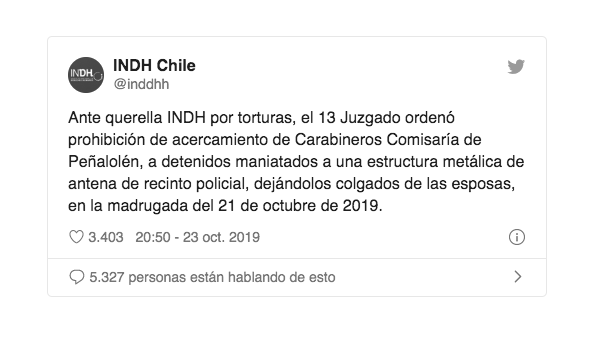
The Human Rights National Institute reports that four detainees were tortured by the 43rd Comisaría de Peñalolén police force in Santiago. Judges invoked the International Convention Against Torture to order measures of protection for the victims. See more
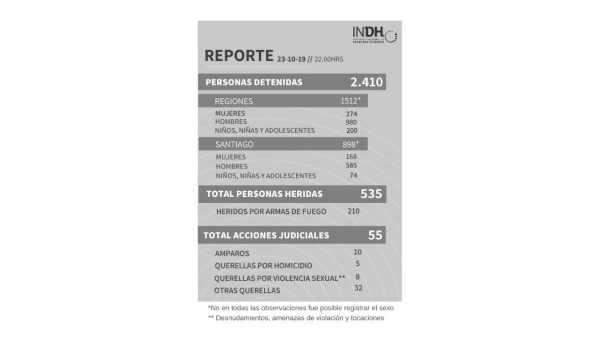
The Human Rights National Institute reports 2,410 detainees and 210 wounded by firearms in the country. See more
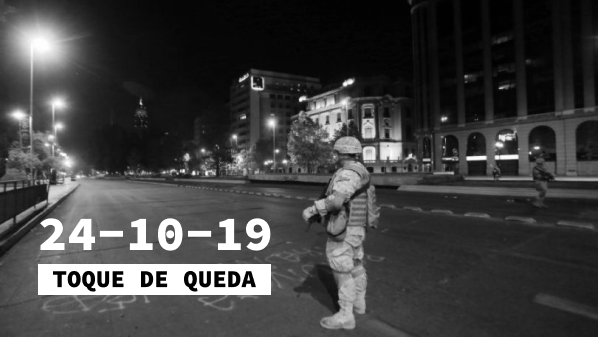
Sixth night of curfew.
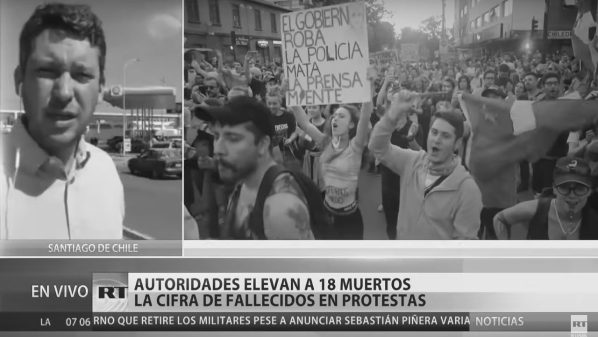
According to authorities, there have been 18 confirmed deaths.
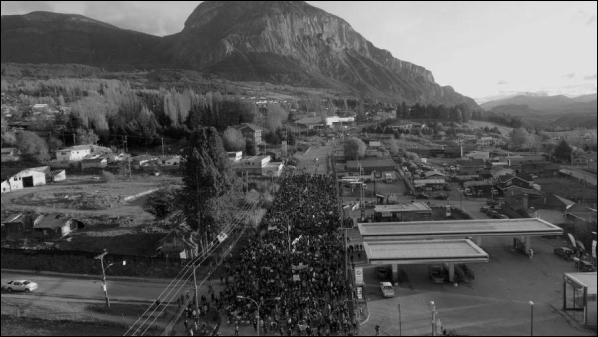
Only the Aysén region remains in a state of non-emergency.
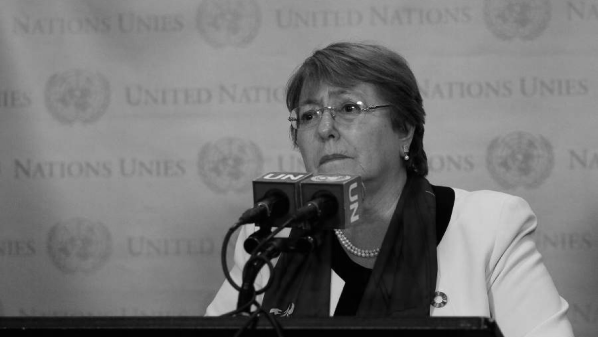
Michelle Bachelet, High Commissioner of Human Rights for the United Nations, announced that the international body will send a verification mission to examine the human rights situation in Chile.
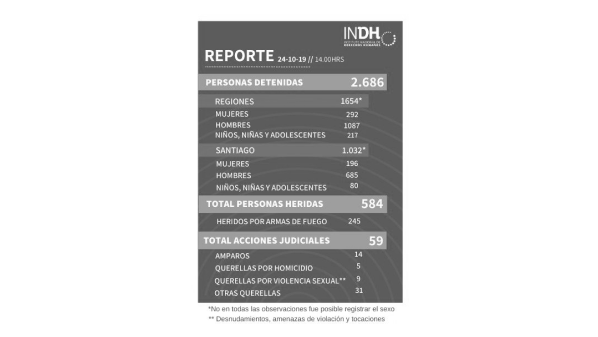
The Human Rights National Institute reports 2,686 detainees and 245 wounded by firearms in the country. See more
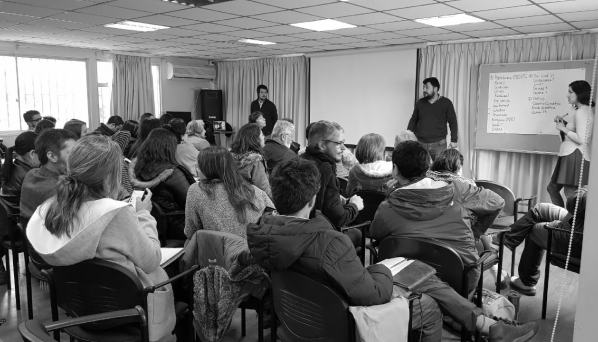
In different neighbourhoods in Chile citizens convene through their own will to analyze the social crisis and elaborate proposals for change. Social organizations and non organized citizens start to meet and debate at public spaces.
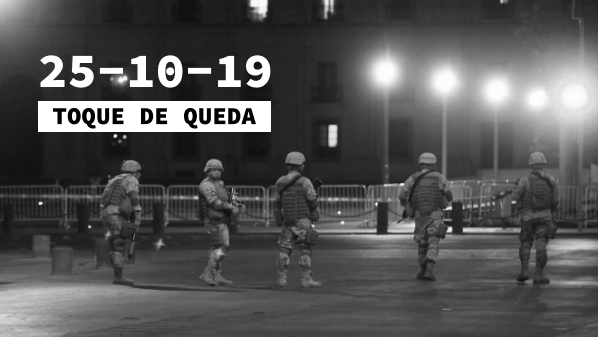
Seventh night with curfew.
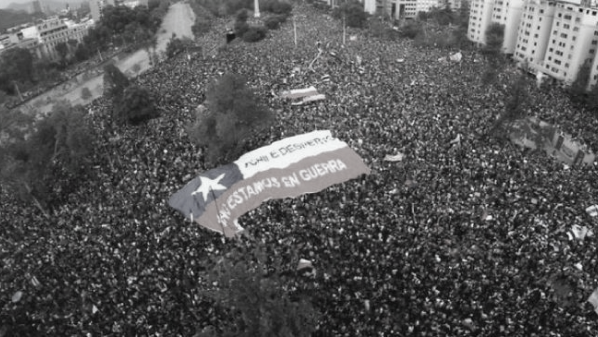
More than 1,2 million people protest in Santiago in one of the largest mobilisations remembered in the country’s history. It’s estimated that 1 from 5 inhabitants from the Great Santiago area went to the mobilization.
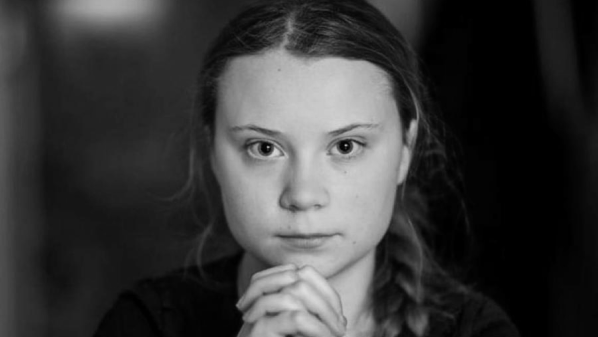
Environmental activist Greta Thunberg sends a solidarity message to Chilean people. See more
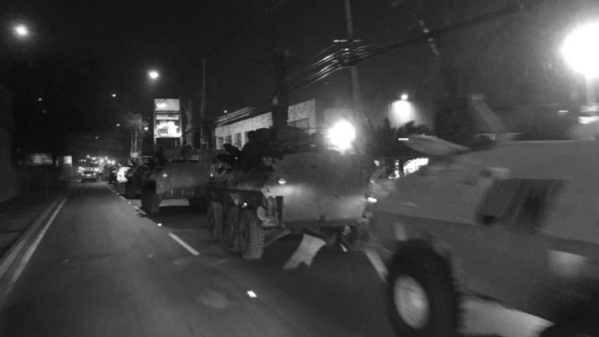
Government announces that it’s assessing to lift all emergency states in Chile since 00.00 hrs. Sunday 27.
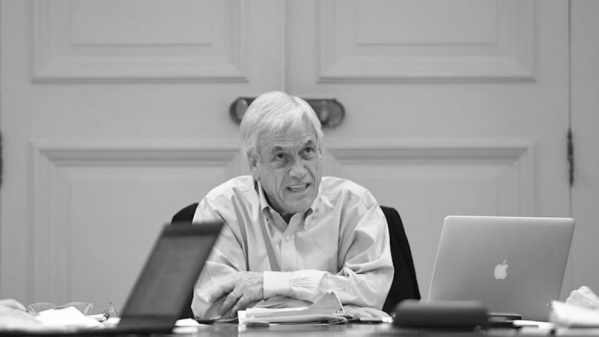
President Sebastián Piñera lifts Metropolitan Region’s state of emergency and asks cabinet ministers to resign, with the aim to “structure the new cabinet, face these new demands and confront the new circumstances”.
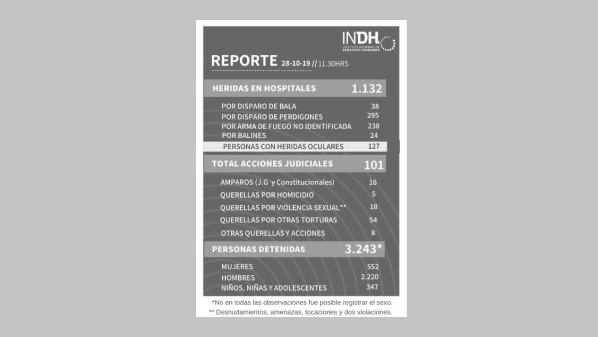
Hasta el momento, hay al menos 20 muertos, más de 1.100 personas heridas en hospitales, y más de 3200 personas detenidas (347 de ellas son niños, niñas o adolescentes).
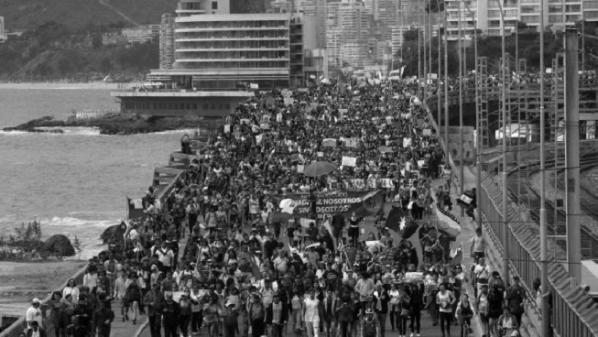
Más de 100 mil personas marchan desde Viña del Mar hasta el Congreso, en Valparaíso, en una de las manifestaciones màs multitudinarias en la historia de la Región de Valparaíso.
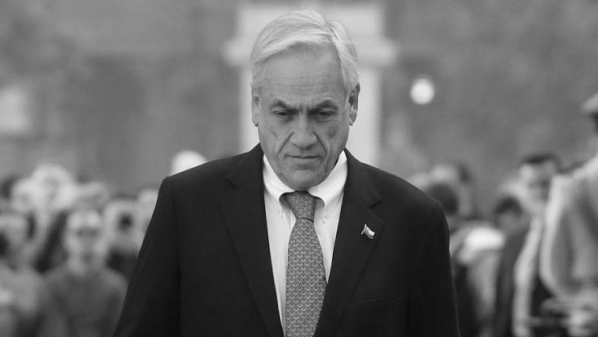
Desde las 00.00 horas, se levanta el estado de emergencia en todas las regiones en las que se habìa decretado.
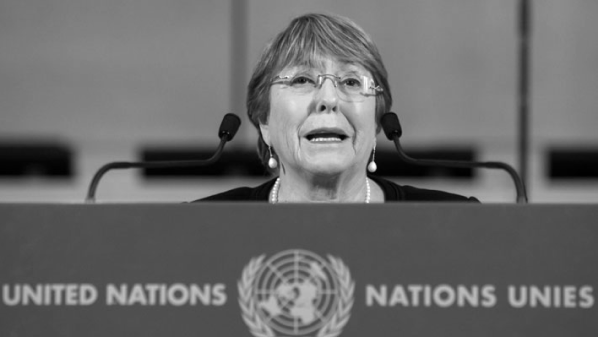
Llega a Chile misión de la ONU que investigará por cuatro semanas los abusos a los Derechos Humanos cometidos durante las movilizaciones ciudadanas.
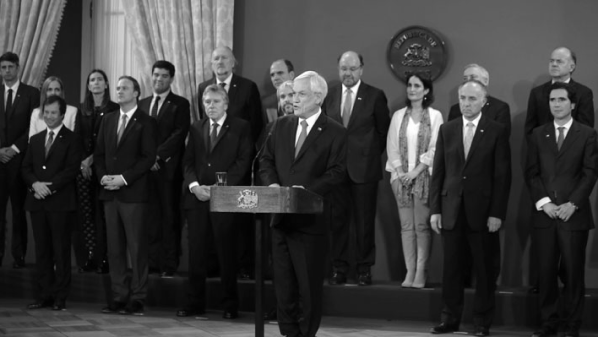
Sebastián Piñera cambia a 8 ministros de su gabinete, reemplazando al cuestionado ministro del Interior, Andrés Chadwick, pero manteniendo a Gloria Hutt, ministra de Transportes, una de las autoridades cuestionadas. See more
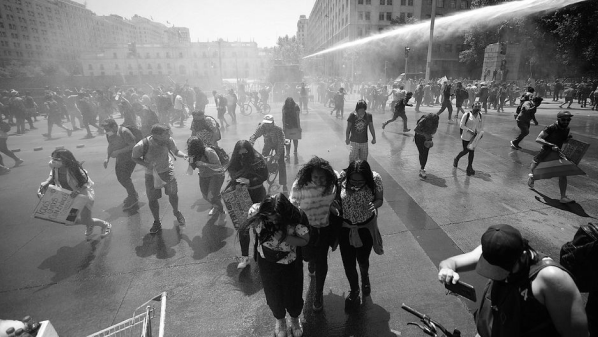
Siguen las manifestaciones a lo largo del país. En Santiago, manifestantes se expresan en los alrededores de La Moneda y son reprimidos por la policía.
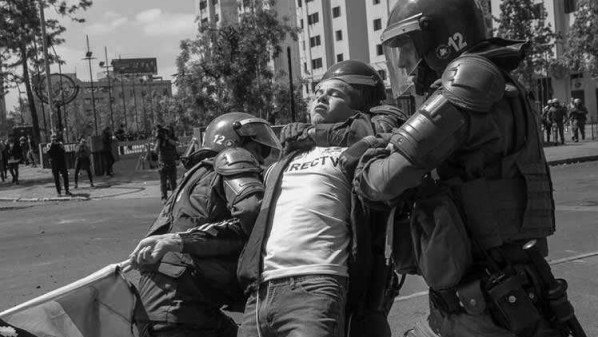
It is been eleven days since protests began in Santiago. Government authorities deliver the following information: 20 people dead and more than 1.200 injured and 9.000 under arrest.
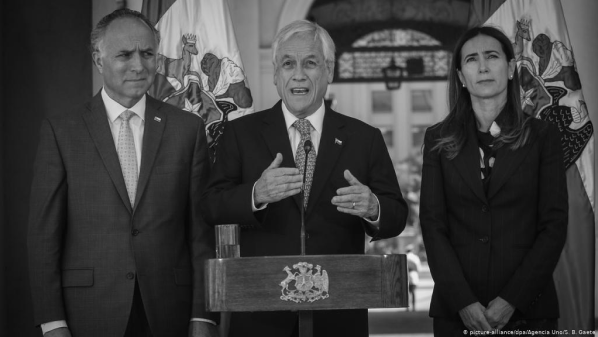
Sebastián Piñera cancels the APEC and COP25 summits, which Chile was going to host. Because of this, Greta Thunberg has to turn back from her trip through the Atlantic.
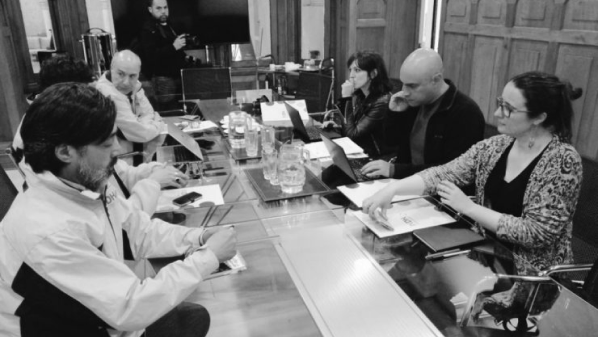
International Amnesty condemns the actions of armed forces stating that they -run counter to international legislation and as such, are human rights violations-.
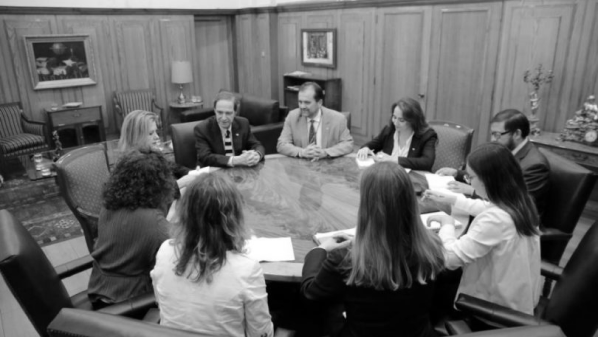
The Ministry of Justice and Human Rights meets the UN’s mission in their first formal appointment. The international team will be in Chile until November 22nd.
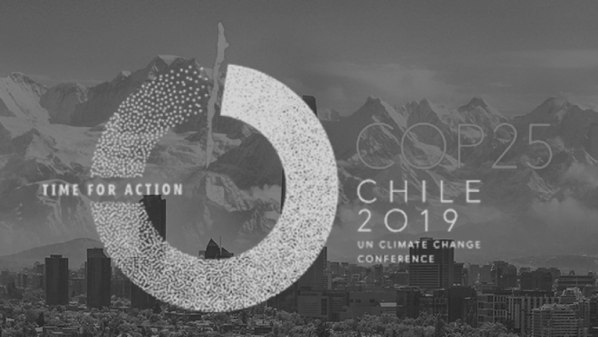
Climate change and environmental organizations condemn the cancellation of COP25.
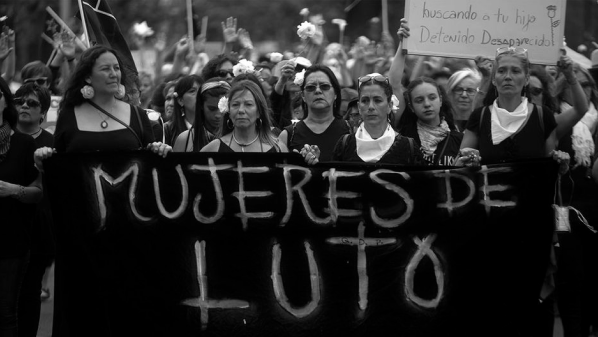
Hundreds of women - wearing all-black clothes - walk to the front of La Moneda. This -march of mourners- is in honor of those who have died.
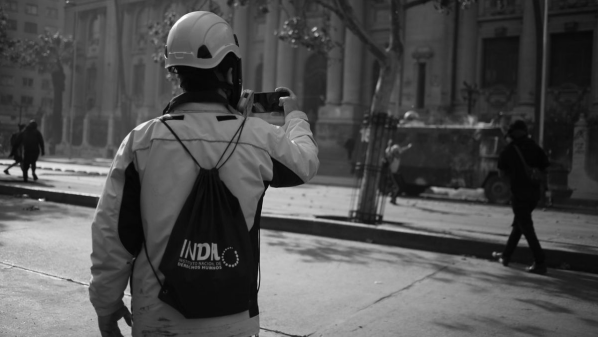
Judiciary actions brought forward by the National Human Rights Institute amount to 179. 132 of them are complaints due to torture.
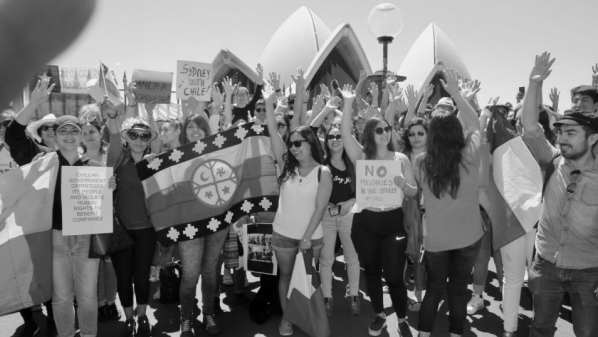
Demonstrations in solidarity with Chile spread to different cities across the world. In Sydney, nearly 350 people meet to chant "Chile despertó".
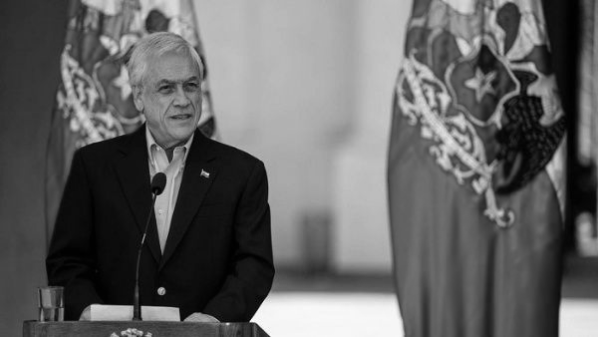
The administration announces a bill that overturns the tax cut for the richest businessmen in the country.
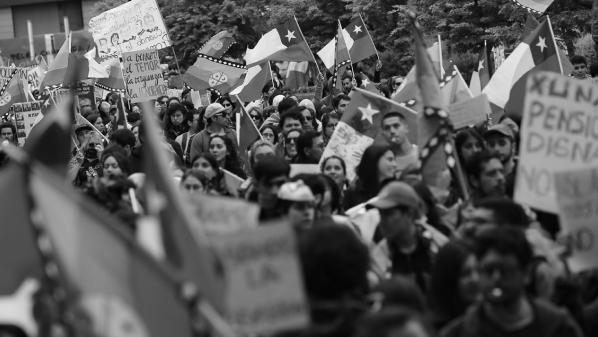
The administration announces a bill that overturns the tax cut for the richest businessmen in the country.
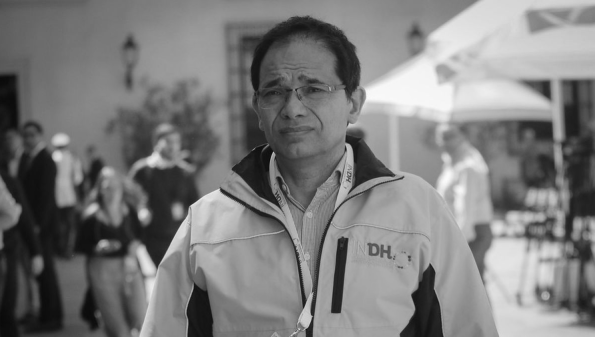
Sergio Micco, director of the National Human Rights Institute, rules out that violations to human rights have happened systematically.
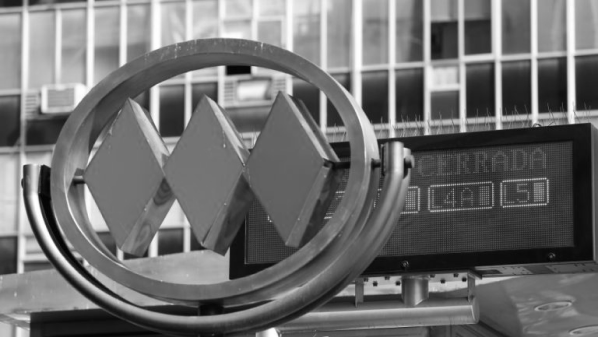
Santiago´s subway reopens 81 of its 136 stations.
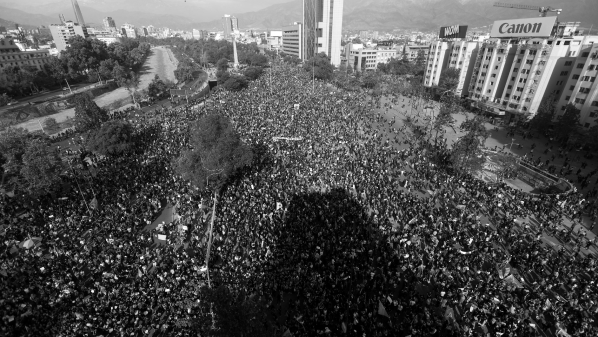
On the streets, new manifestations arise in what people call the third "Super Monday" of protests.
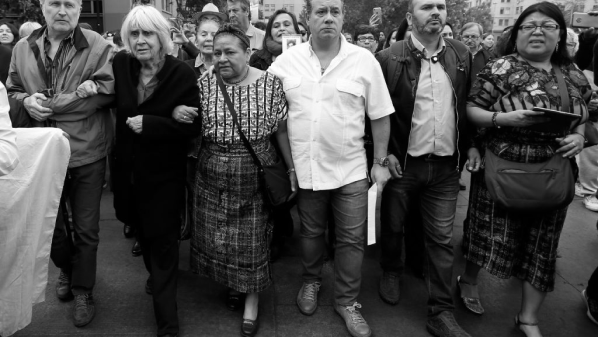
Rigoberta Menchú, Nobel Peace Prize winner, warns that unless -deep reforms are passed, the Chilean crisis will last a couple of decades-.
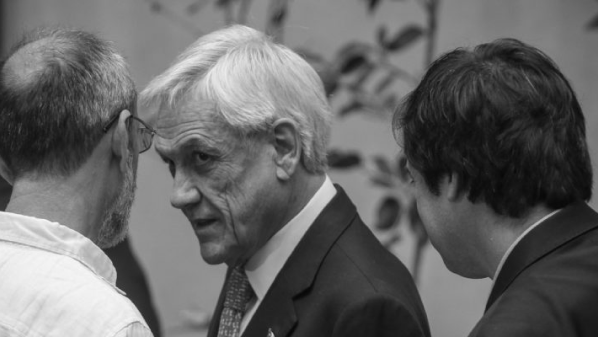
The 7th Juzgado de Garantía of Santiago declares the complaint presented against Sebastián Piñera, for -crimes against humanity- that took place during the states of emergency imposed, admissible.
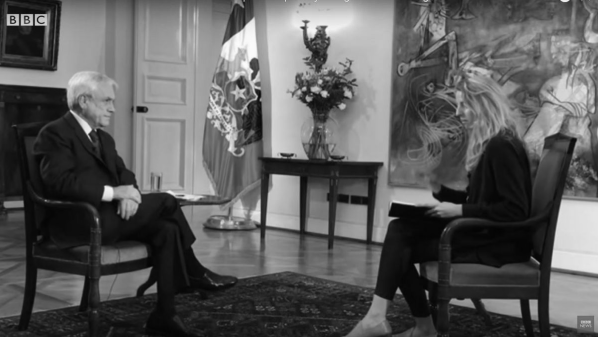
Sebastián Piñera gives his first international interview to the BBC, in which he justifies and fully backs how armed forces have acted in the past weeks. Full interview here. See more
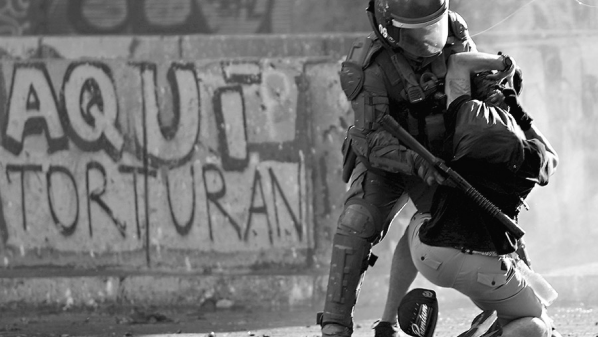
12 members of the Special Forces and 2 policemen (Carabineros) will be prosecuted for torture against two people while under arrest, one of them underaged.
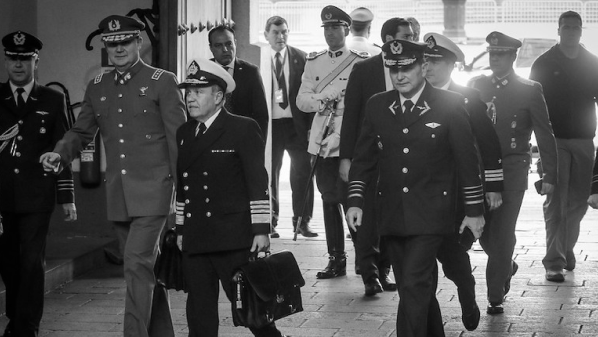
Piñera summons the National Security Council (Cosena in Spanish). This initiative is heavily criticized by the general public and even by some of its own members: the National Comptroller and both Heads of Congress.
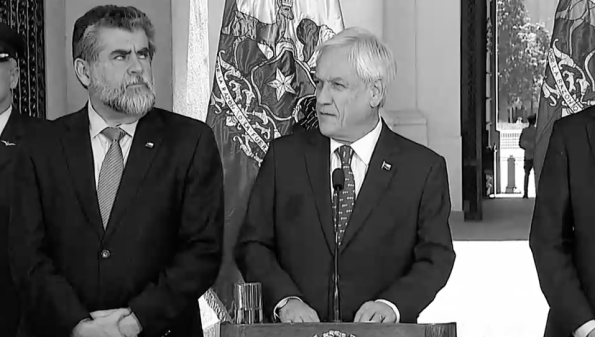
The President presents a security agenda with 10 policies: an “anti looting” law, an “anti hooded demonstrators” law and an “anti riots” law, among other measures.
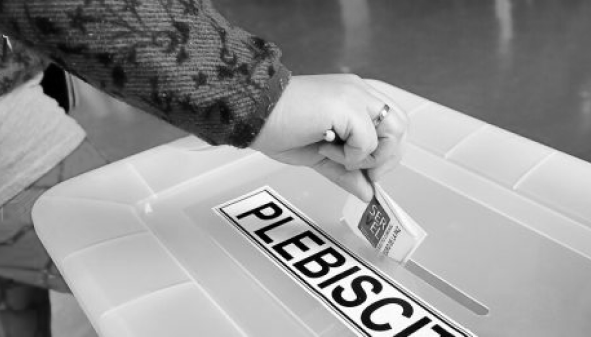
The National Association of Municipalities decides to conduct a plebiscite among its 330 members in order to consult whether citizens desire a new Constitution.
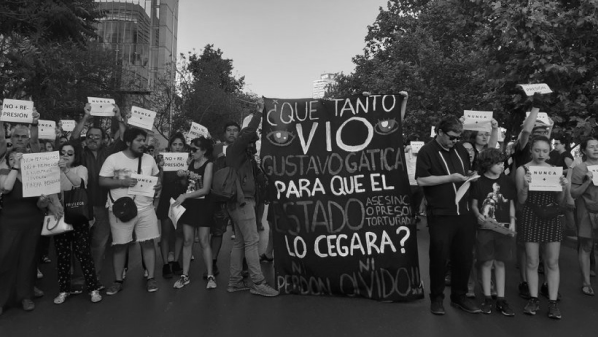
Gustavo Gatica, a college student, is shot by police officers. Both of his eyes are hurt with pellets.
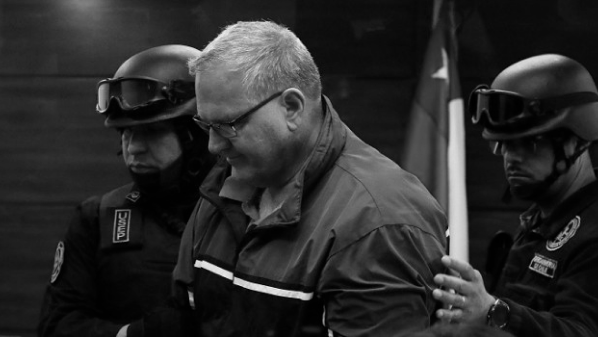
For the first time, a civilian attacks demonstrators. John Cobin, a supremacist and US citizen, opens fire in a manifestation in Reñaca hurting one person.
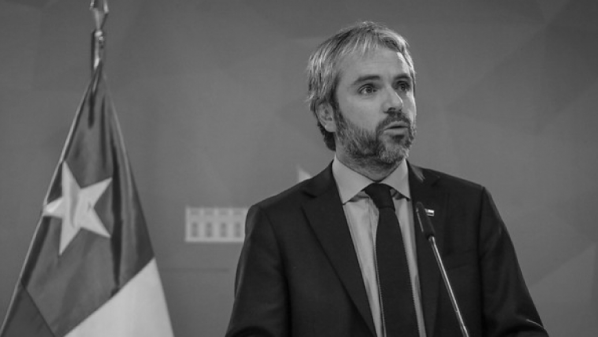
The administration announces a Constitutional Congress to craft a new Constitution that will then be ratified by the population through a plebiscite. They rule out a Constitutional Assembly.
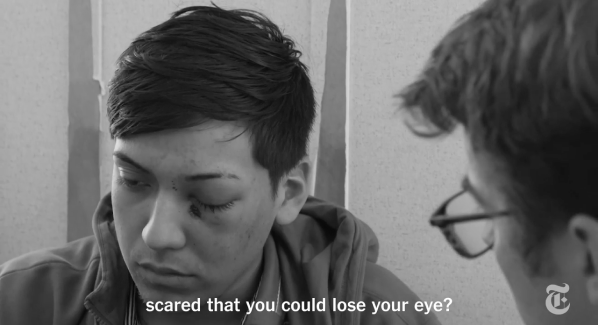
The New York Times publishes a story on the historic health crisis taking place due to police blinding protesters with pellet guns. See more
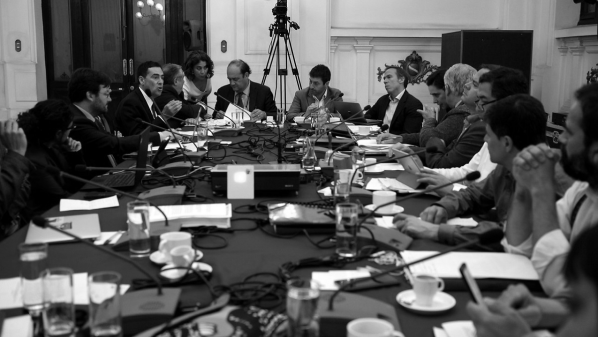
The House of Representatives’ Constitution Commission approves a national plebiscite to consult citizens about a new Constitution. See more
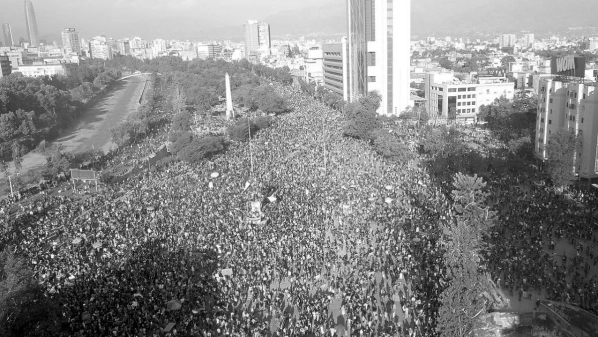
More than 115 organizations from across the country form part of the national labor strike. In Santiago, 80.000 people march to Plaza Italia.
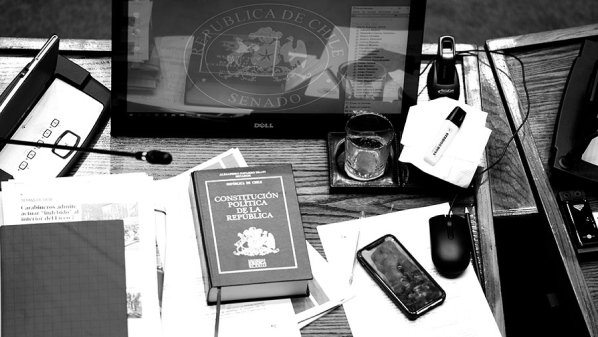
Political parties of the opposition say they are in favor of a plebiscite and a constitutional assembly to draft a new Constitution.
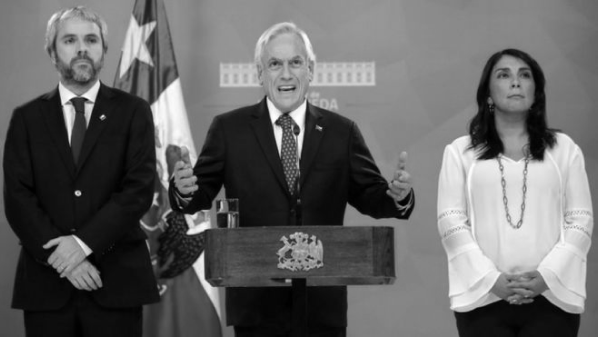
The administration proposes three measures to overcome the crisis: an alliance for peace, one for justice and one for a new Constitution. In order to mitigate violence, they rehire retired policemen.
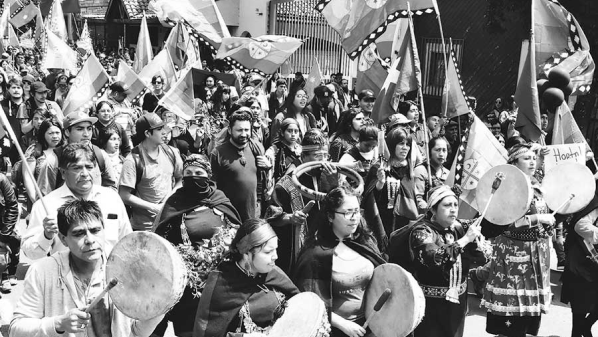
This day marks a year since the assassination of Camilo Catrillanca. In Temuco, near 4.000 people march peacefully outside of the Regional Government’s headquarters.
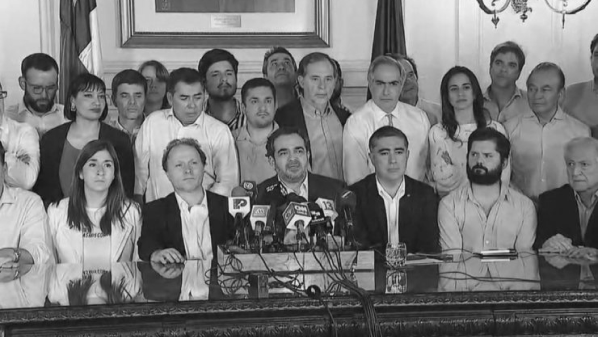
Parlamentarios presentan el Acuerdo por la paz social y nueva Constitución. En él, definen la realización de un plebiscito para consultar a la ciudadanía si quiere cambiar la constitución y a través de cuál de los mecanismos de redacción propuestos, convención mixta o convención constituyente. See more
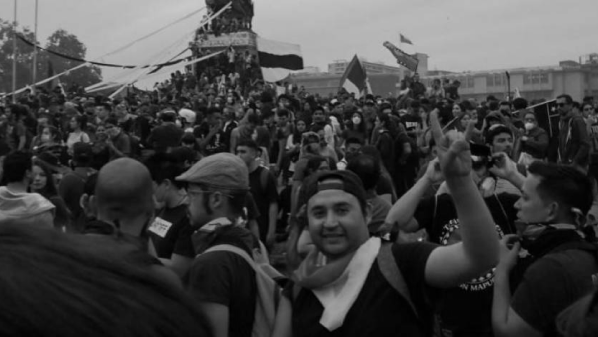
Abel Acuña, a man that was protesting in Downtown Santiago dies after suffering a cardiorespiratory arrest. The National Human Rights Institute maintains that police repression obstructed the medical team’s work that came to his aid.
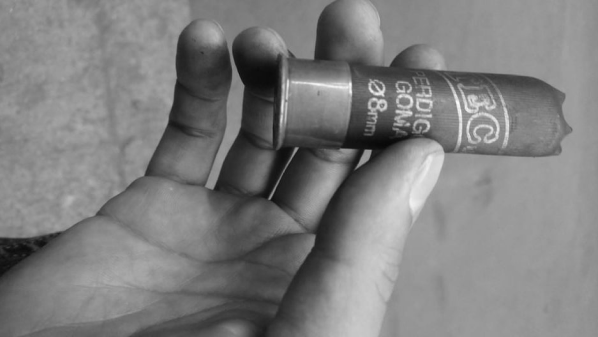
A report issued by Universidad de Chile proves that alleged rubber bullets used by police forces are in fact 80% lead and 20% silicon and barium sulfate. See more
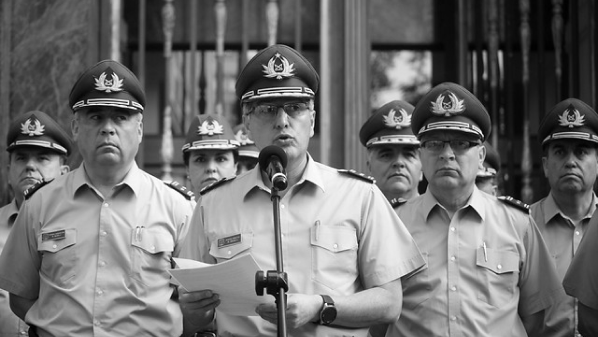
The Police’s Chief Officer denies that it was police offers that obstructed medical aid from saving Abel Acuña’s life. He also questions the results exposed about the composition of pellets and ensures that they use rubber bullets. See more
.jpg)
The Executive Secretary of the Interamerican Commission of Human Rights (CIDH, in Spanish), Paulo Abrão, starts their on-site investigation in Chile. Their first meetings are held with different civic and social organizations, the Minister of Justice, Hernán Larraín, and the Human Rights Secretary, Lorena Recabarren. See more
.jpg)
Parlaments of the Opposition present constitutional accusation against Sebastián Piñera for responsibility in human rights violations during the demonstrations. See more
.jpg)
The Medical college meets with the commission investigating the impeachment accusation against the former Minister of the Interior, Andrés Chadwick. They question the excessive use of force by police against protesters. Police (Carabineros) decides to ban anti-riot guns. See more
.jpg)
Piñera states that the impeachment accusation against him has “no basis”. See more
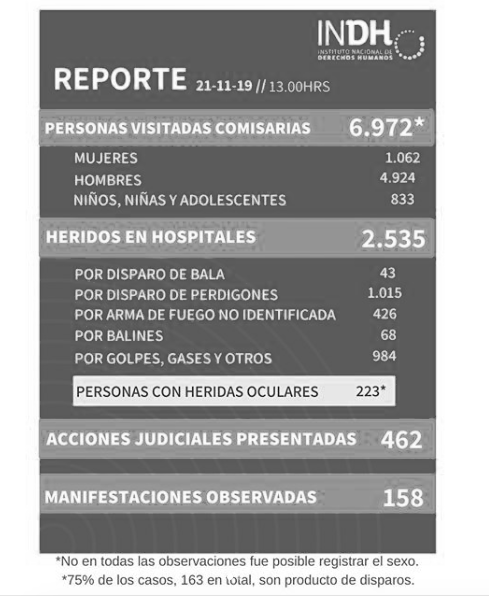
The National Human Rights Institute reports 6.972 people arrested and 2.535 in hospitals. Nearly half of those injured are due to attacks with pellet guns. There are 223 cases of eye trauma. See more
.jpg)
The government, through the Secretary of Human Rights Lorena Recabarren, rejects the findings of Amnesty International accusing the organization of “irresponsible assertions”. The police issues similar criticism saying they “categorically reject all excesses” and that their institution “does not shelter illegality”. See more
.jpg)
Amnesty International finalizes their mission in Chile concluding that security forces intentionally carried out widespread attacks using unnecessary and excessive force, with the intention of injuring and punishing protesters who are exercising their legitimate rights of freedom of expression and peaceful assembly. See more
.jpg)
The UN’s mission comes to an end after visiting seven different regions and interviewing more than 230 victims. The final report will be published in the upcoming weeks. See more
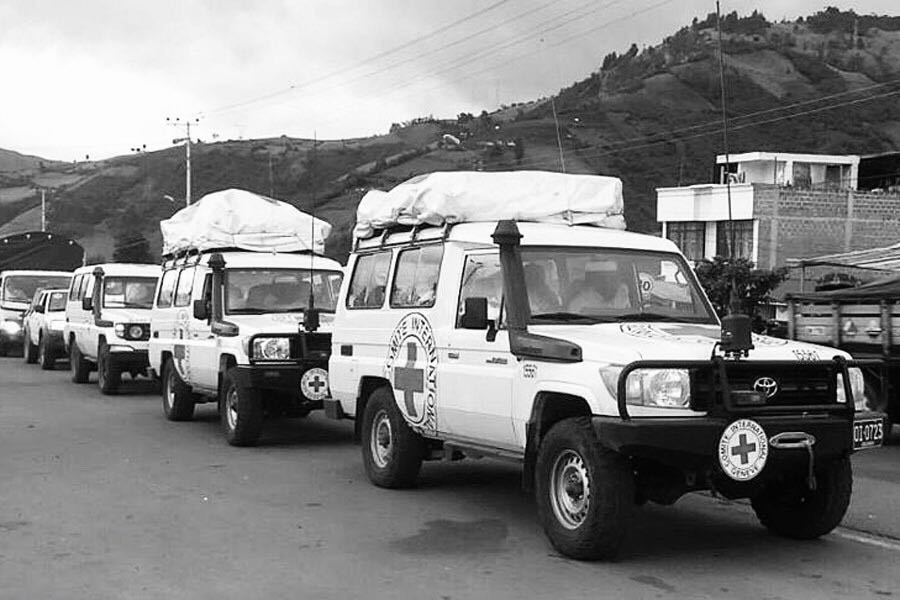
The Red Cross reports a shortage of first aid kits and materials. The organization has given assistance and care to more than 5.000 people since the beginning of the protests. See more
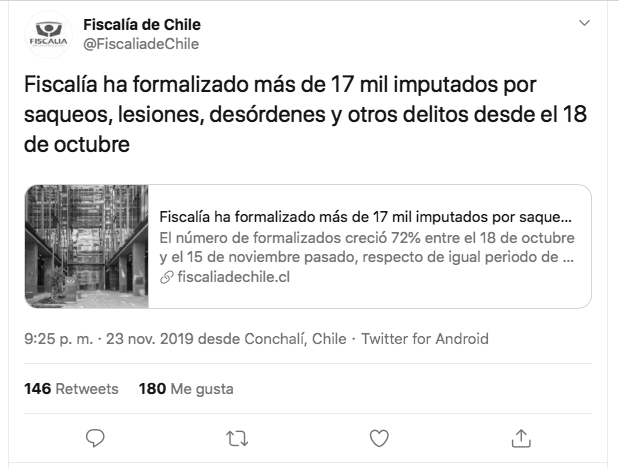
The National Prosecutor’s Office counts nearly 17,000 cases of people accused of disturbing public order, causing riots and bodily injuries. See more
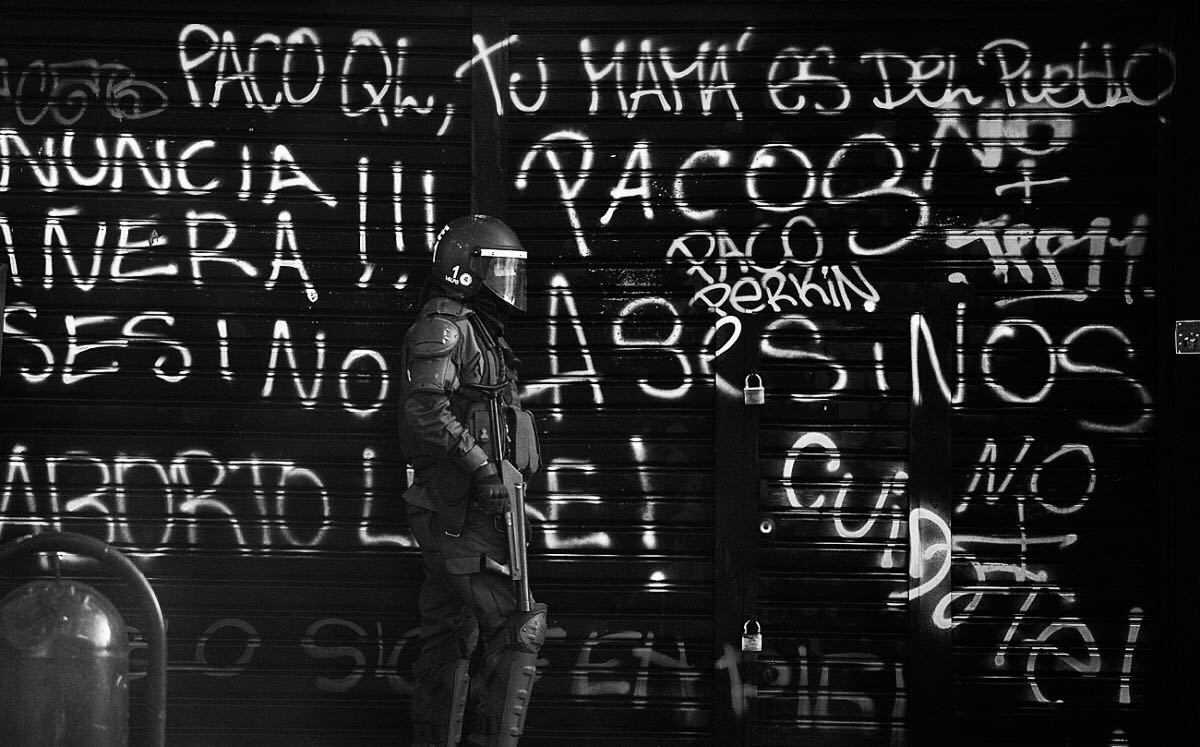
Human Rights Watch says that national police, Carabineros, committed serious human rights violations, and is expecting that the “judicial power will act rapidly and rigorously to sanction those policemen and army soldiers involved”. See more
.jpg)
Piñera announces a new bill in which the military will be allowed to safeguard certain strategic property and public utility premises without the need for declaring states of exception/emergency. See more
.jpg)
The report published by Human Rights Watch concludes that policemen “are more likely to force women and girls to strip than men”. In cases where both women and men were detained, “it was solely the women who were forced to take their clothes off.” See more
.jpg)
Gustavo Gatica, the 21-year old college student hurt by scatter pellets, is discharged from the hospital with a diagnosis of permanent blindness in both eyes. See more
.jpg)
In the midst of several reports from international organizations exposing grave violations to human rights in Chile, the French police deny their consulting services to the Chilean Carabineros.
.jpg)
Senate signs agreement for social peace, human rights and public order. That document demands to the Government “to implement a deep social agenda with structural changes to face the inequalities of our country”. See more
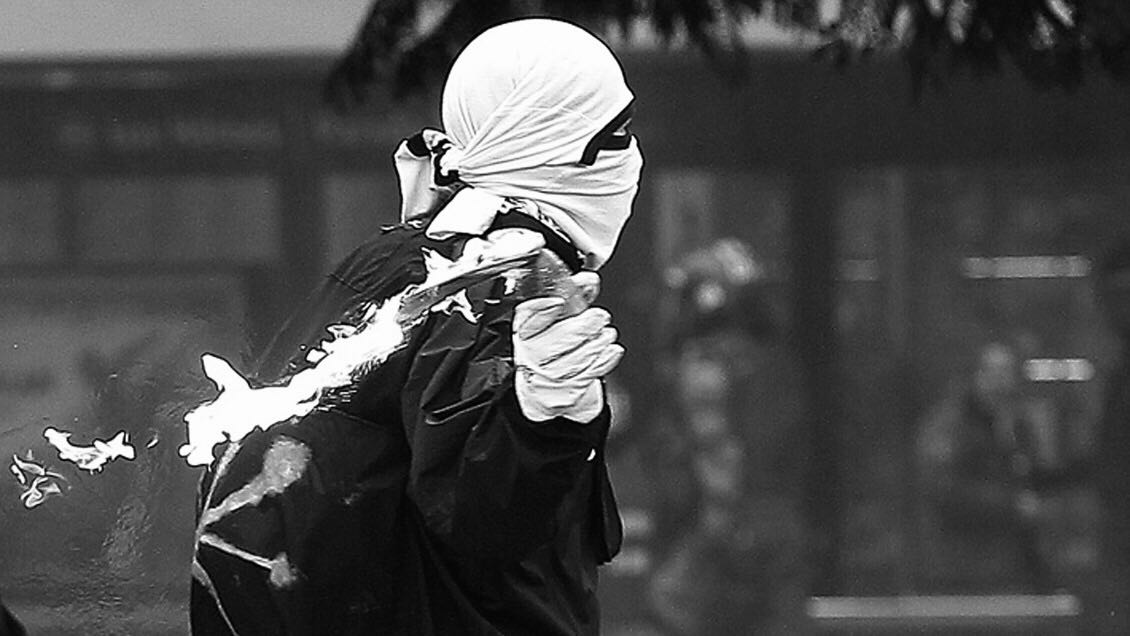
The law against protesting with a hood, mask or covered face is approved in the Senate. See more
.jpg)
Unidad Social, the association of civil organizations and labor unions, meet with the Minister of the Interior, Gonzalo Blumel in order to discuss policy proposals. Among those who attend are the Teacher’s Association, the Central Labor Union (CUT), and No+AFP (a civil organization fighting for reform in the pensions system). See more
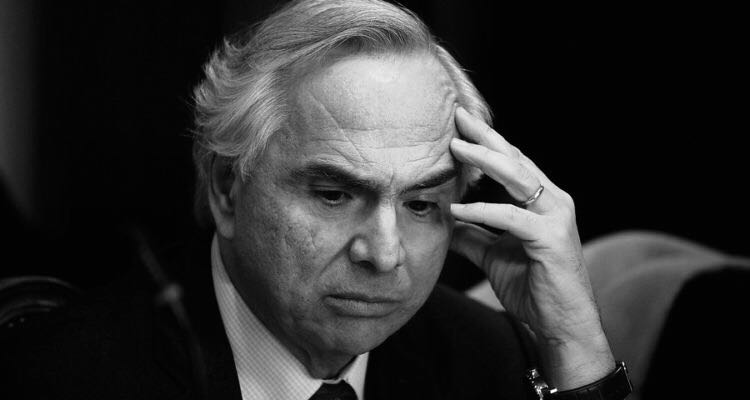
Congress declares the Constitutional accusation against the former Minister of the Interior, Andrés Chadwick, admissible. See more
.jpg)
Feminists gather to protest violence and sexual abuse against women by singing “a rapist in your way”, a chant created by the feminist collective “Las Tesis”. This is imitated by women in other cities throughout the World. See more
.png)
The National Prosecutor’s Office confirms 20.217 charges presented. Of those accused, 1.957 are held in custody. See more
.jpg)
The Defense Minister, Alberto Espina, stands by the controversial bill that’s being presented to allow for the army to safeguard “critical infrastructure” without the need of declaring states of emergency. He states: “[the opposition] would have never dictated a norm that allowed impunity for those committing irregular acts.”. See more
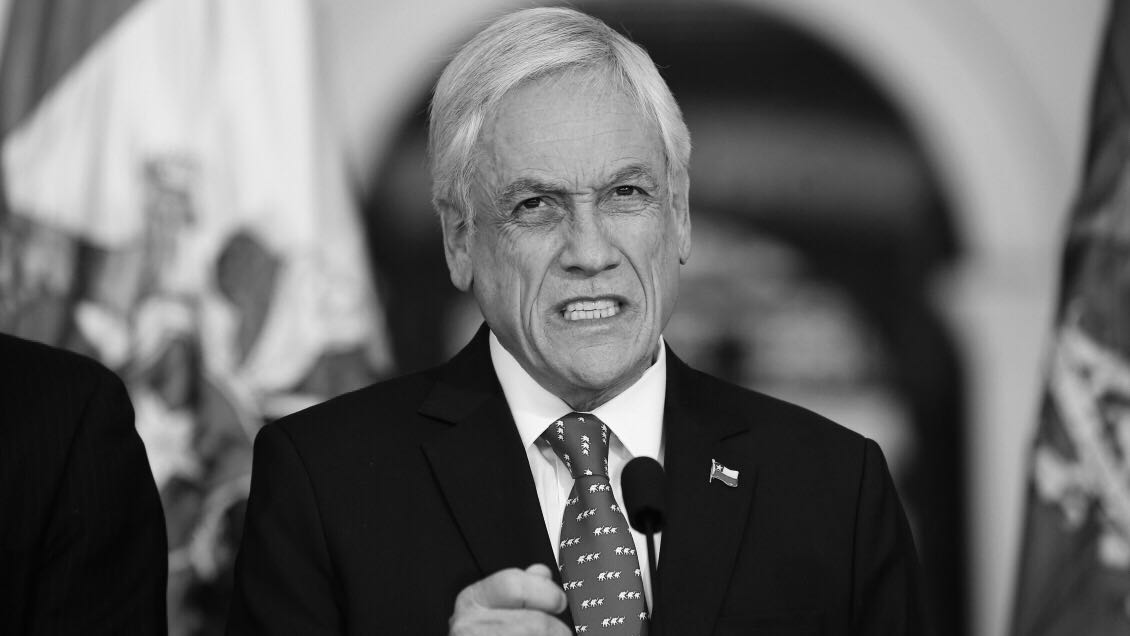
With only 10% of approval rate, Piñera is the worst evaluated President since the return to democracy. His disapproval rate is 82%. At the same time, 67% of respondents approve mass protests and manifestations. See more
.png)
Piñera addresses the attendees of COP25 explaining the Chilean social crisis. He declares that the country has suffered “a wave of criminality that we have confronted with the tools that democracy affords us, safeguarding the human rights of all: any deviation from this standard is being investigated by the Prosecutor’s Office and will be taken to court”. See more
.png)
To cope with the economic downturn due to the chilean crisis, Piñera announces questioned bonus of 50 thousand pesos (63 USD) for 1 million 300 thousand for people with less resources. See more
.jpg)
The Senate approves the Anti-Crash Law and Anti-Barricade Law, a project that seeks to tighten penalties for behaviors that prevent the regular functioning of public order, such as paralyzing public services, barricading or destroying real estate. See more
.jpg)
Unidad Social - composed of unions and civil society organizations - firmly rejects these laws stating that this continues with Sebastián Piñera’s policy of declaring war against the people. “We defend our right to manifest, to protest, and to civil disobedience, precisely as international human rights conventions establish.” See more
.jpg)
In an official report, the Interamerican Court of Human Rights warns about the excessive use of force employed by the police and calls on authorities to “act immediately” in order to stop it. See more
.png)
The Ministry of the Interior announces that for the first time in 51 days of social protests there are no “grave incidents” reported. See more
.jpg)
The Minister of the Interior, Gonzalo Blumel, dismisses claims by international human rights organizations that have reported human rights violations in the country, saying that police have data from “other sources”. See more
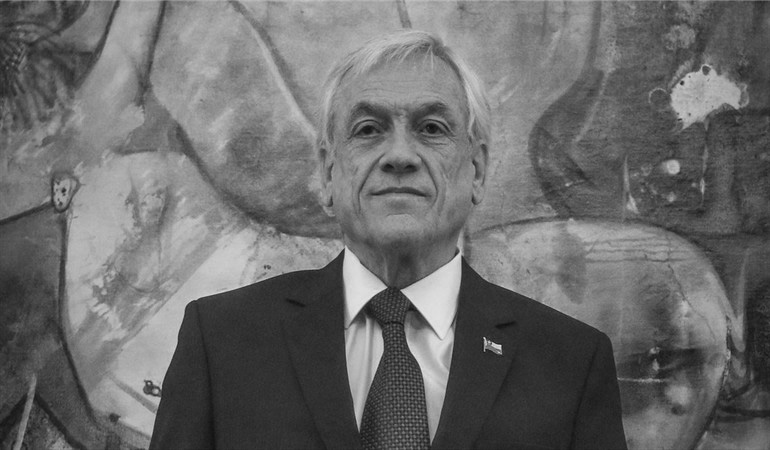
Piñera announces different policies he calls “An anti-abuse agenda and for a fair and dignified treatment”. These include measures against tax evasion, collusion and seeks criminal punishment for “white-collar crimes”. See more
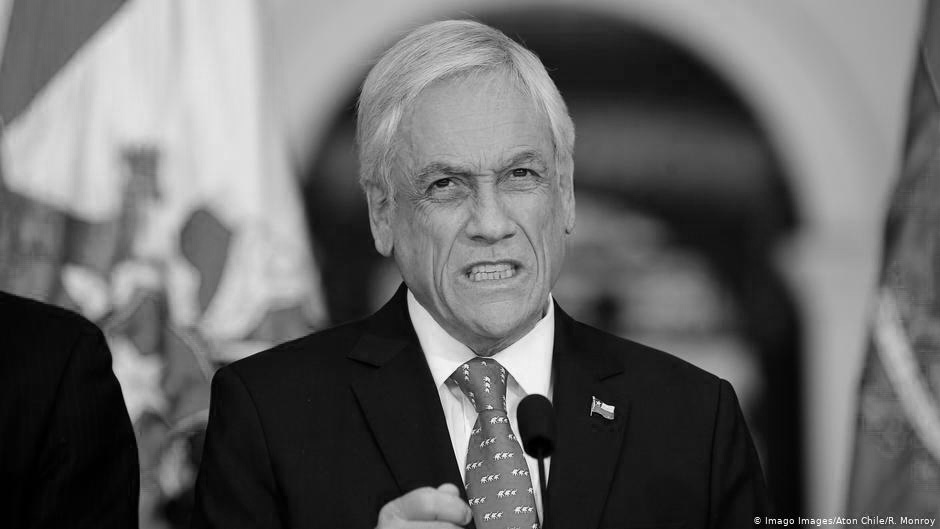
Piñera acknowledges that "in the last 52 days we have known many cases and reports of abuses to human rights." and announces a comprehensive Eye Recovery Plan and the creation of a special team to accompany victims of sexual violence by uniformed men. See more
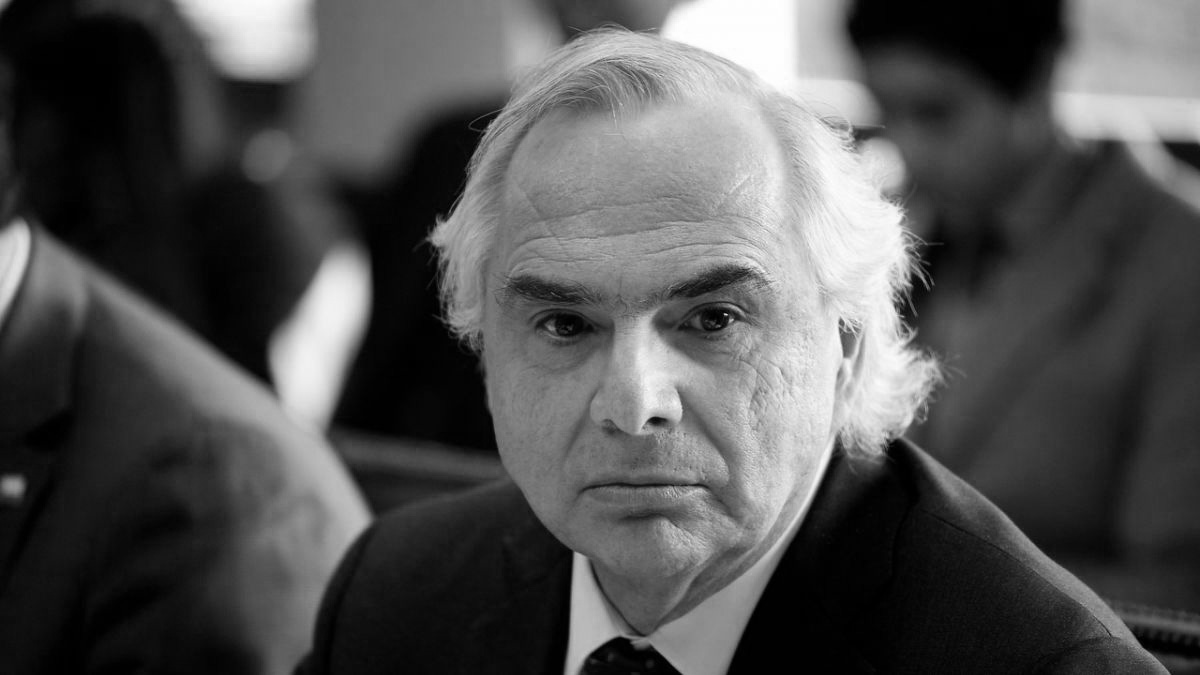
Congress ratifies their constitutional accusation against former Minister of the Interior, Andrés Chadwick. He insists on his innocence denying having ever committed any action "that allowed for human rights abuses or violations". See more
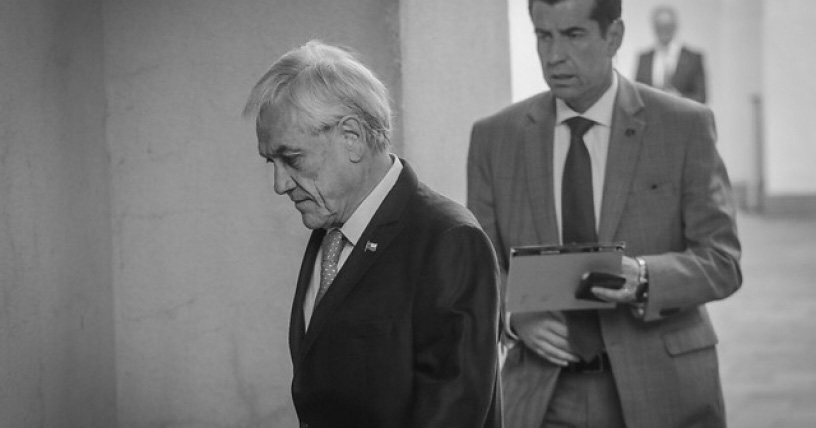
The political opposition seeks support for an investigative commission to examine the Piñera's family millionaire transfer of funds to offshore tax havens. See more
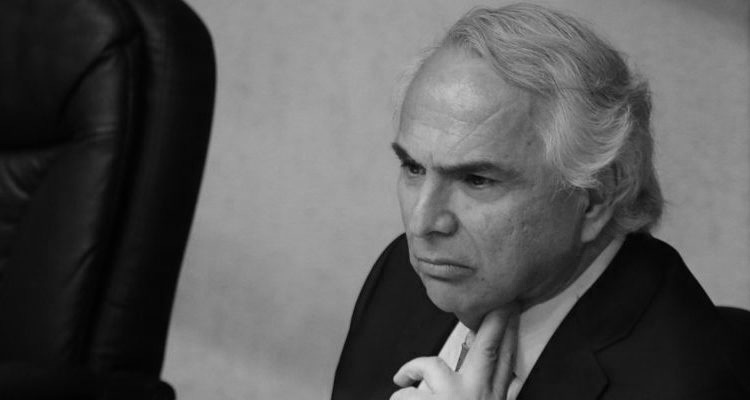
Andrés Chadwick, former Minister of the Interior, is declared politically responsible for violations of human rights during the state of emergency as the constitutional accusation is approved. See more
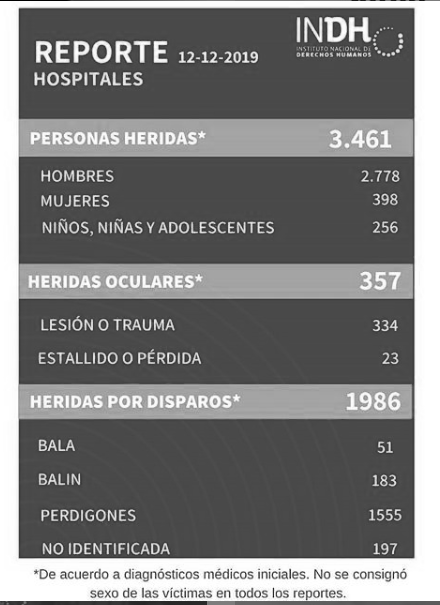
The National Human Rights Institute reports 3.461 people injured, 357 with eye trauma, and 1.986 wounds due to firearms. They've filed 792 complaints in court. See more
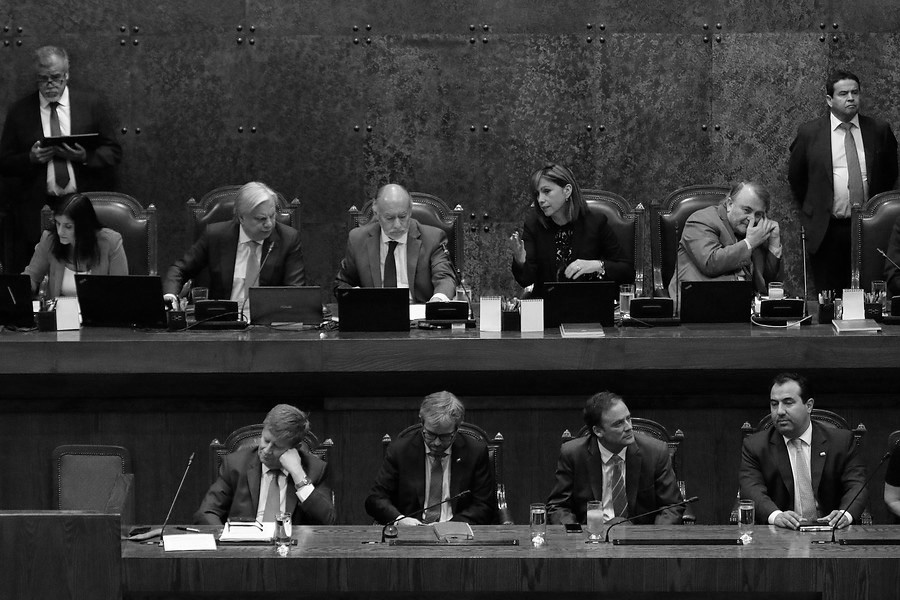
Congress dismisses the constitutional accusation against Sebastián Piñera. See more
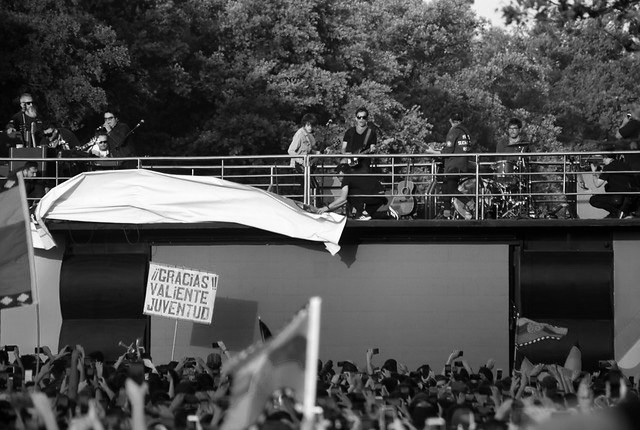
After 57 days of mobilization, thousands of people congregate in a massive concert in the renamed Plaza de la Dignidad as a peaceful protest. See more
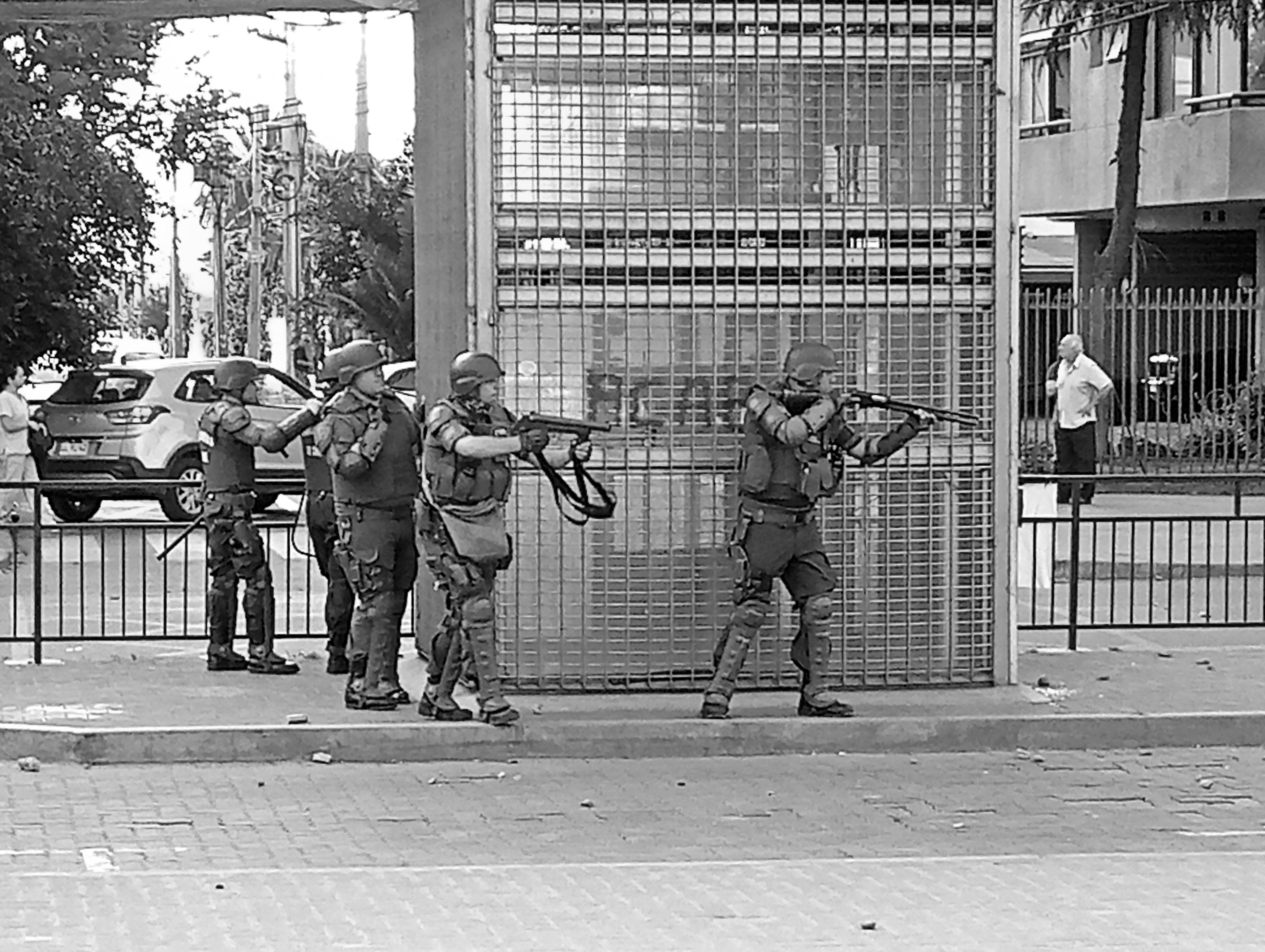
The UNs High Commissioner for Human Rights publishes a report about the situation in Chile. It establishes that there has been "an elevated number of serious human rights violations". Part of the recommendations is to suspend the use of antiriot shotguns and weapons immediately. See more
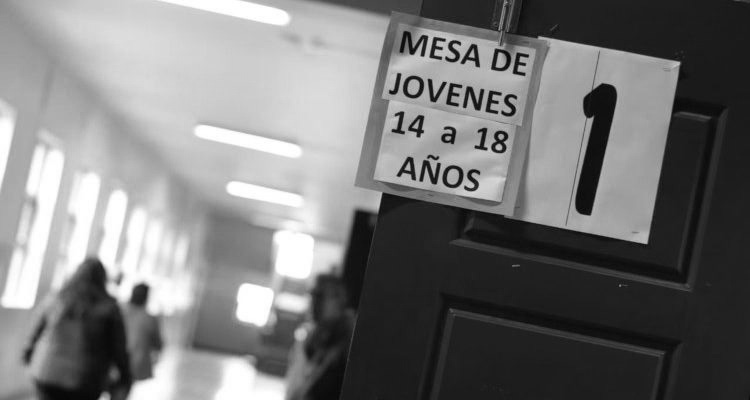
More than 2 million people vote in the "Citizen Consultation", an initiative spearheaded by more than 225 local governments across the country. See more
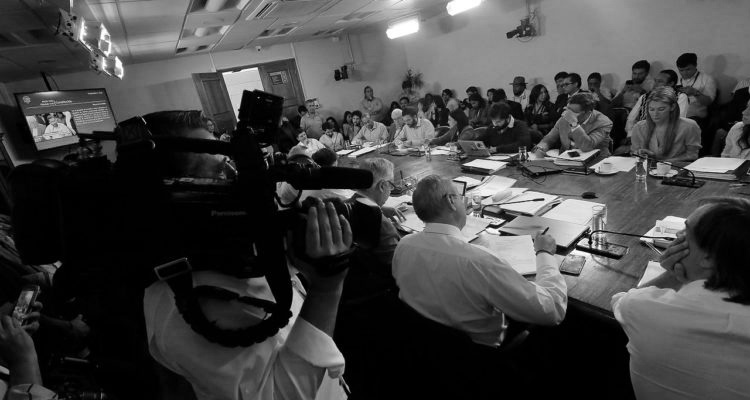
Congress approves the bill that incorporates gender parity and reserved seats for indigenous people in the Constitutional Assembly. See more
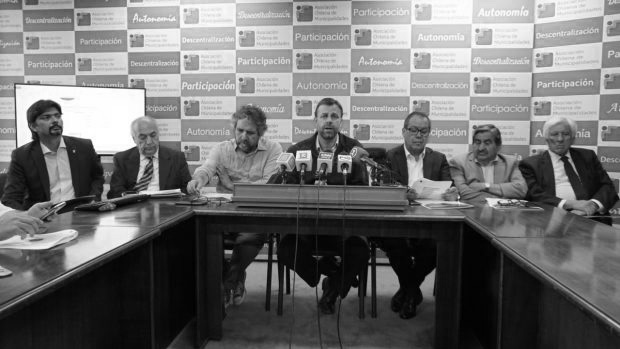
92.4% of those who participated in the Citizen Consultation approve a new Constitution. Of those, 73.1% want a constitutional assembly that is 100% newly elected. See more
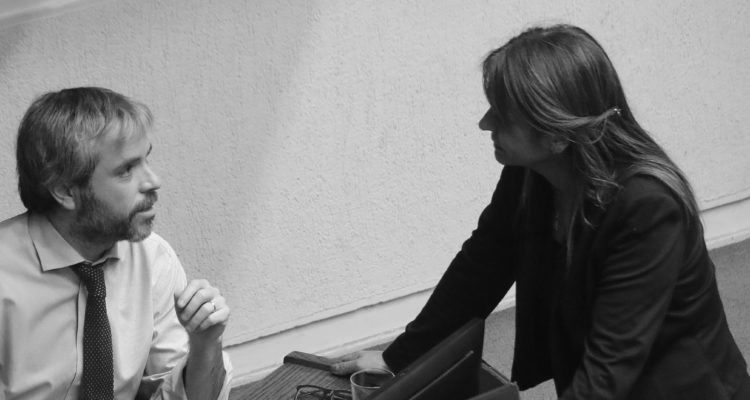
The Independent Democratic Union (UDI) party suspends participation in the center-right coalition Chile Vamos, after deputies of National Renewal supported indications on gender parity, indigenous peoples and independent candidates.. See more
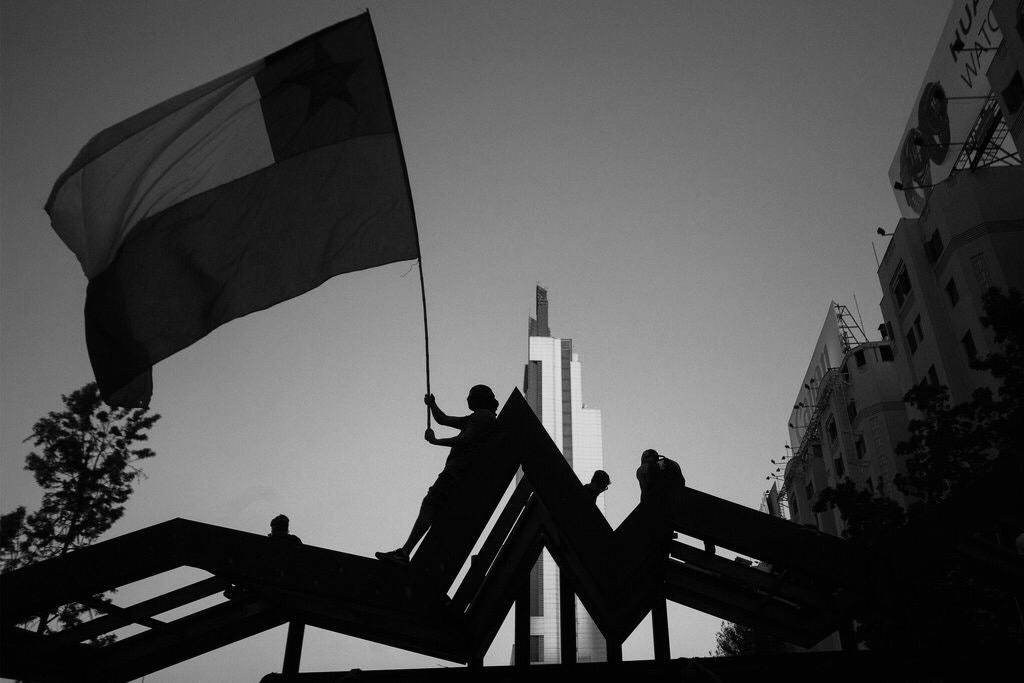
Piñera publishes an op-ed in the New York Times where he ensures that his administration “took every measure possible in order to guarantee the maximum respect for human rights”. In spite of this, he recognizes the excessive use of force by policemen. See more
.jpg)
The bill for gender parity and reserved seats for indigenous people in the Constitutional Assembly is now in the Senate. See more
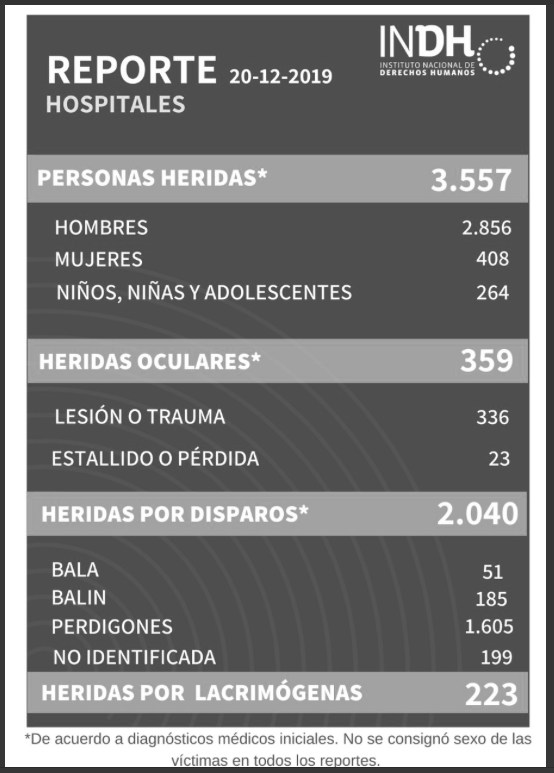
More than 3,500 people have been injured in the context of social protests and riots. Nearly 2,000 of them have suffered injuries due to firearms. See more
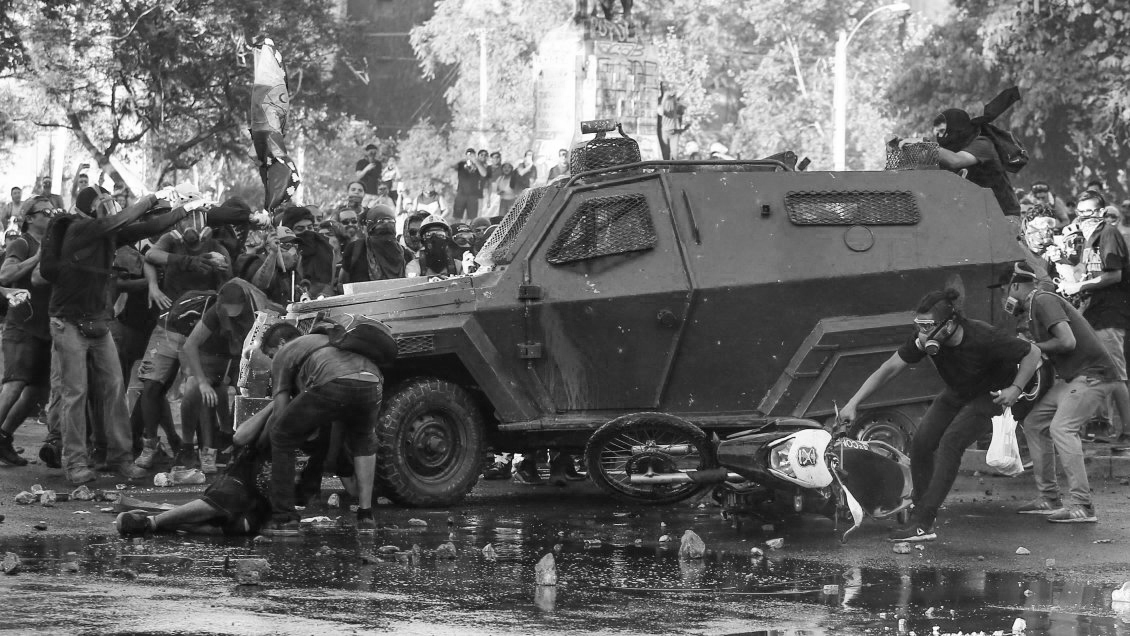
Oscar Pérez, a 17-year old, is brutally crushed between two police cars resulting in a fractured pelvis. See more
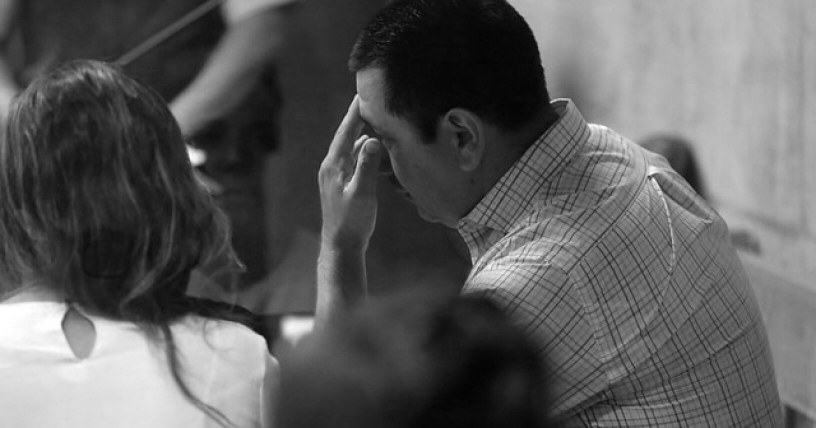
The police officer, Mauricio Carrillo, who run over and crushed a person participating in the protests is sanctioned with a monthly signature for the next 150 days. See more
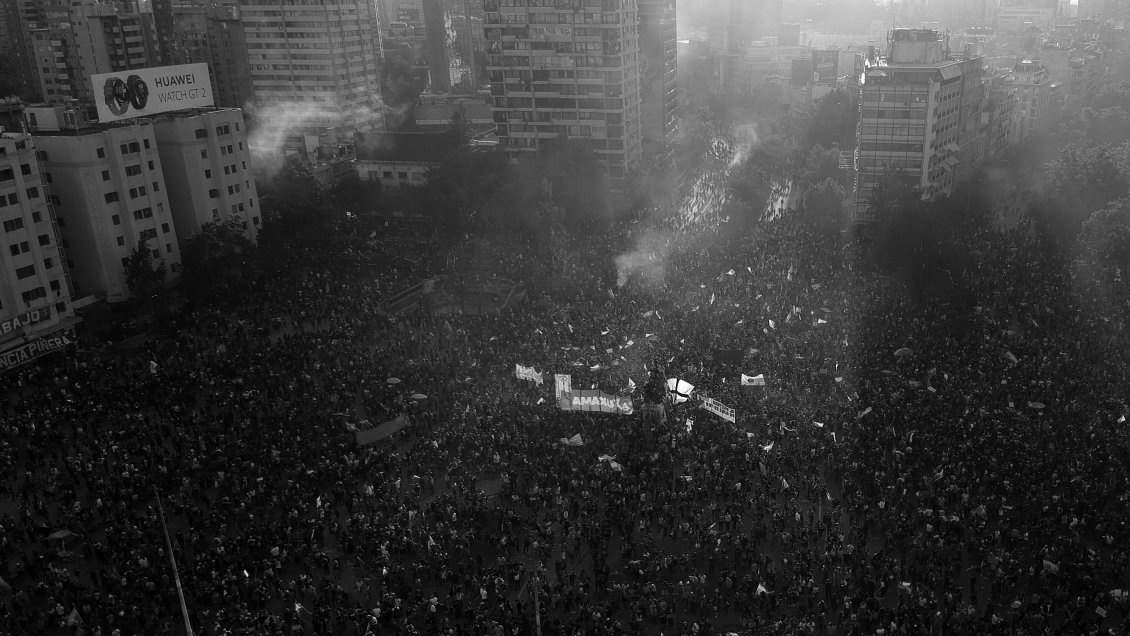
The administration presents an intelligence report that is heavily criticized by the center-left coalition and people in general. This document, which sought to use big data in order to prove international influence, concludes that a third of Twitter users who tweeted about the Chilean social movement are not based in Chile. See more
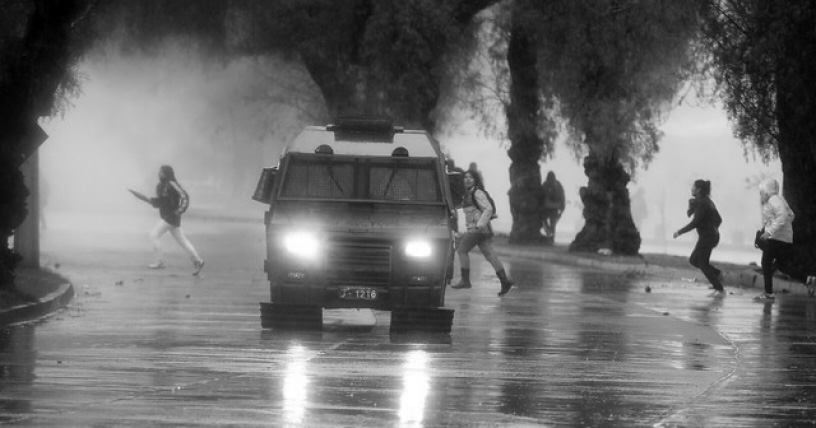
The UN once again calls on the government to respect the right to protest. The Metropolitan Region’s Intendent, Felipe Guevara, evaluates police action as “adequate”. See more
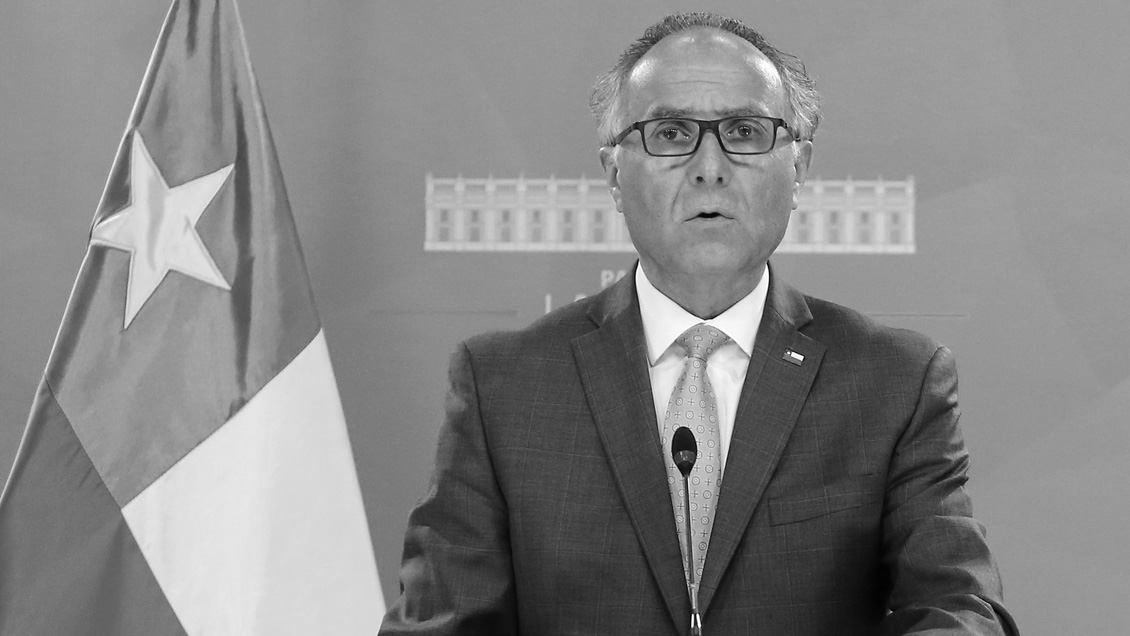
The Minister of Foreign Office declares: “We ve been asked whether or not our country will ever be the same; we ve said no, because if we are capable of open dialogue, of recognizing our strengths and weaknesses, we’ll become a better country, with more solid institutions and a more inclusive society”. See more
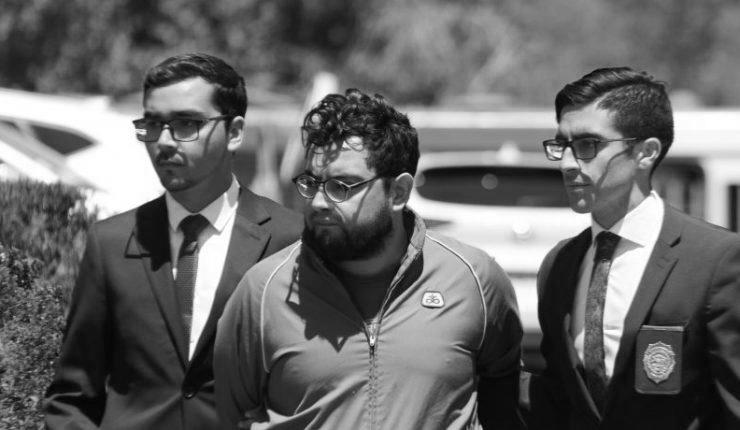
Roberto Campos, is freed from pre-trial detention after 50 days. He had been incarcerated after being accused of damaging a subway turnpike. See more
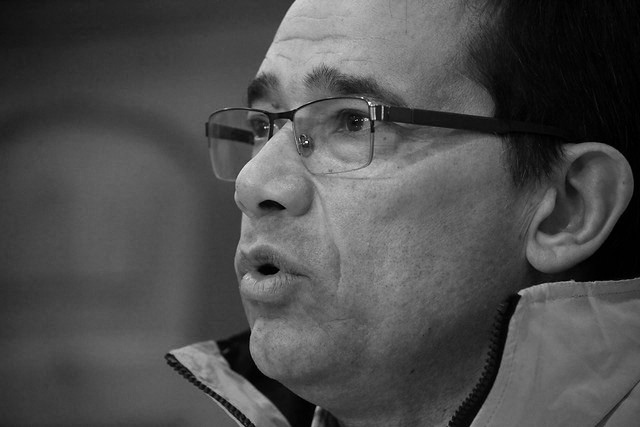
The Human Rights Institute Director presents an annual report about human rights, emphasizing that there have been “multiple human rights violations and of uttermost seriousness”. See more
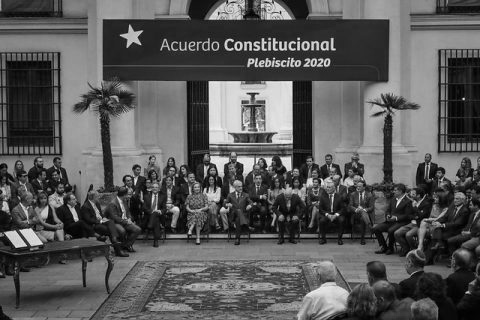
Piñera passes the law that will allow for a new constitutional process. See more
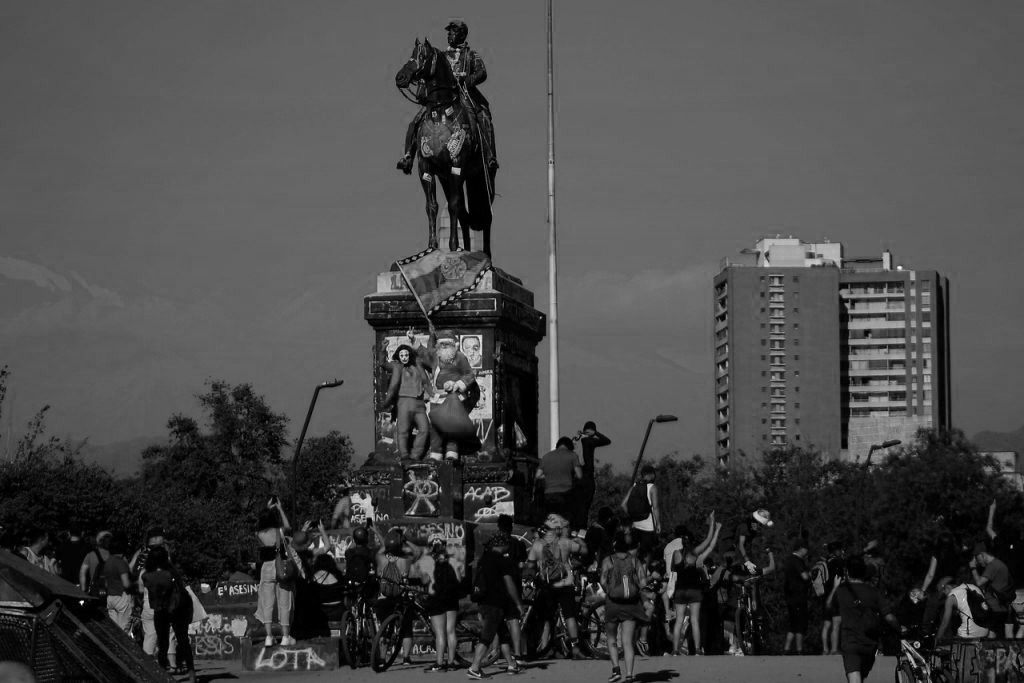
Police cars repress with teargas a Christmas dinner that was taking place in Plaza Italia. See more
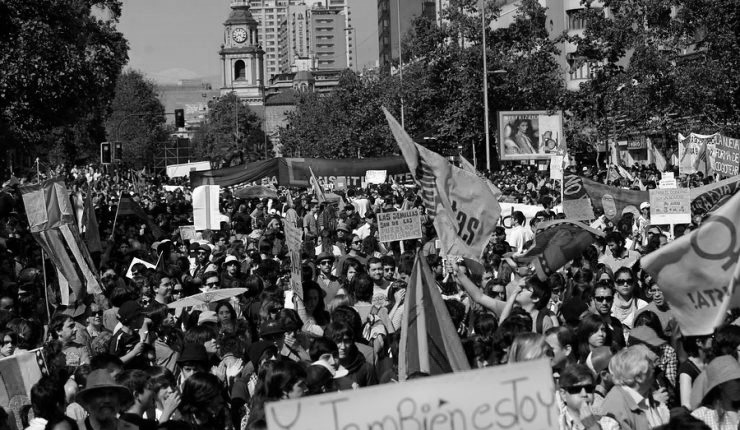
Experts confess that they rejected a request from the administration’s Press Secretary that had asked them to write a report that confirmed international intervention during the social movement. See more
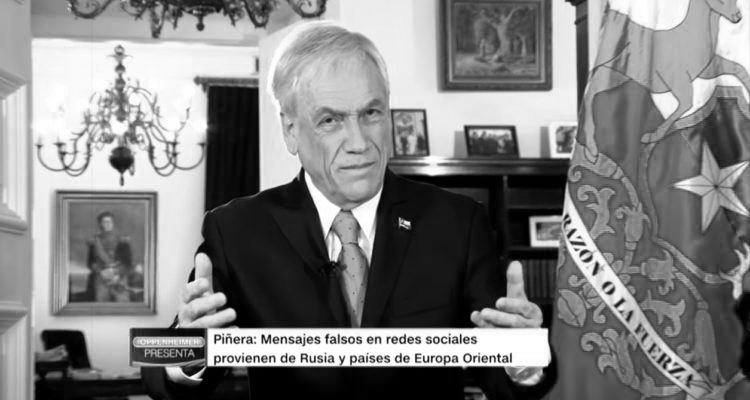
In a CNN interview, Piñera stated that foreign governments have intervened in Chile with a “misinformation campaign and fake news in order to create a feeling of absolute crisis”. See more
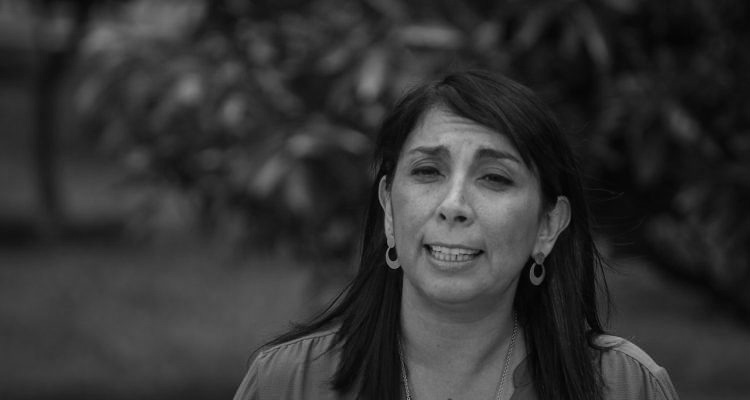
The administration’s spokesperson, Karla Rubilar, explains the President’s sayings about alleged fake videos showing human rights violations. She establishes that most of the content shown online is actually taking place in Chile although 'there are 4 or 5 that have been recorded abroad'. See more
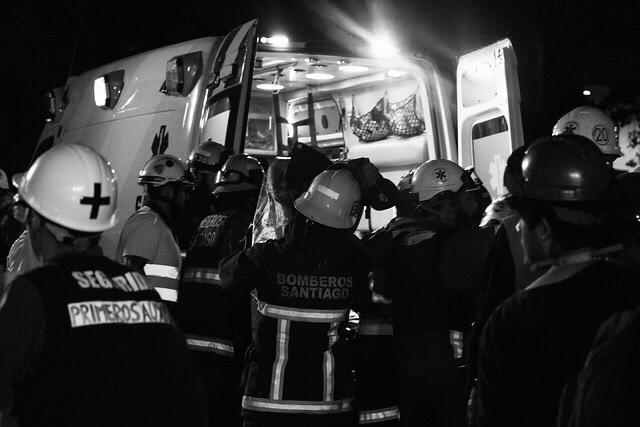
Mauricio Fredes, a person who was taking part in protests downtown, dies after falling into a water pit while escaping police repression. See more
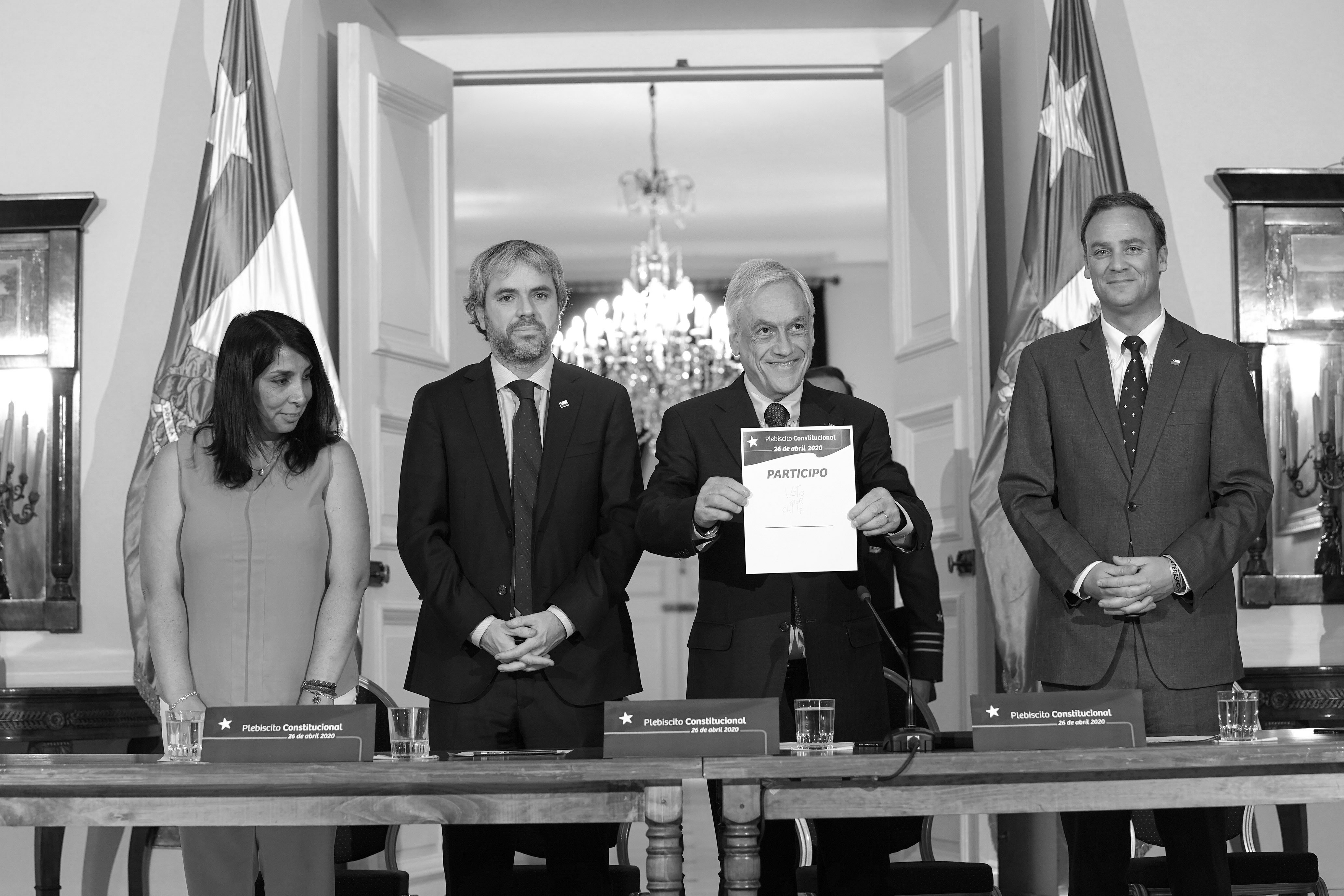
Piñera convokes a national plebiscite for April 26th, people will be able to vote in favor or against a new Constitution. See more
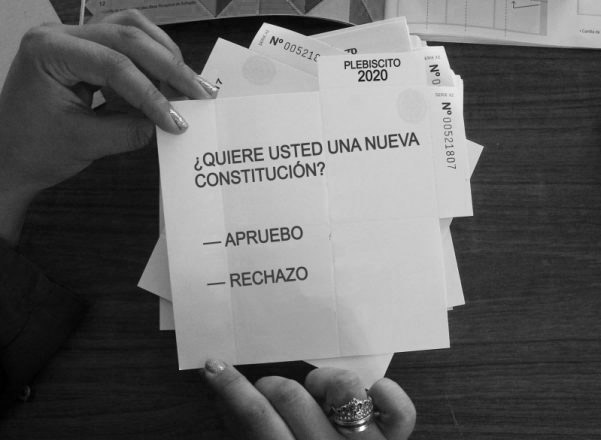
The National Elections Committee officially launches the Constitutional process that will take place during 2020. See more
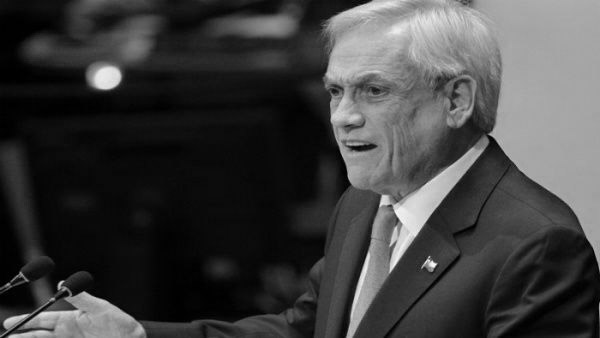
After two months of protests and social demonstrations, Piñera maintains that “the worst part of this crisis is over and now we have to take the lessons learned to build a better country”. See more
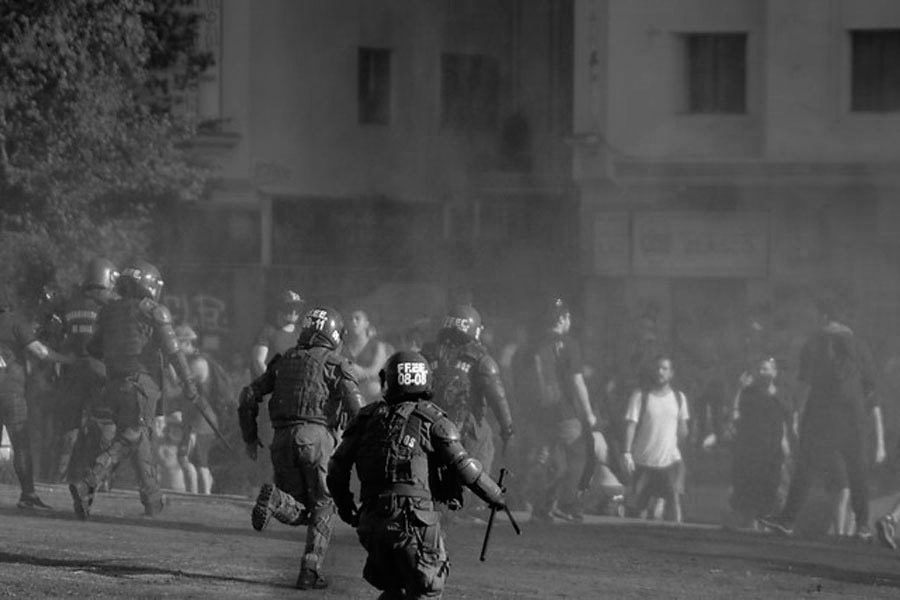
The Inter-American Court of Human Rights maintains its concerns about the “ongoing acts of violence and disproportionate use of force perpetuated by the police”. See more
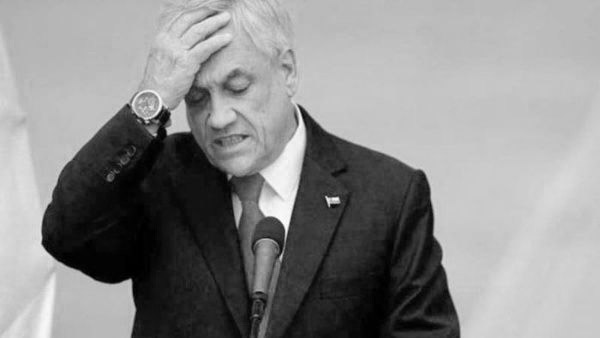
Disapproval rates of Piñera’s administration reach 80%. 64% of people say that protests should continue. See more
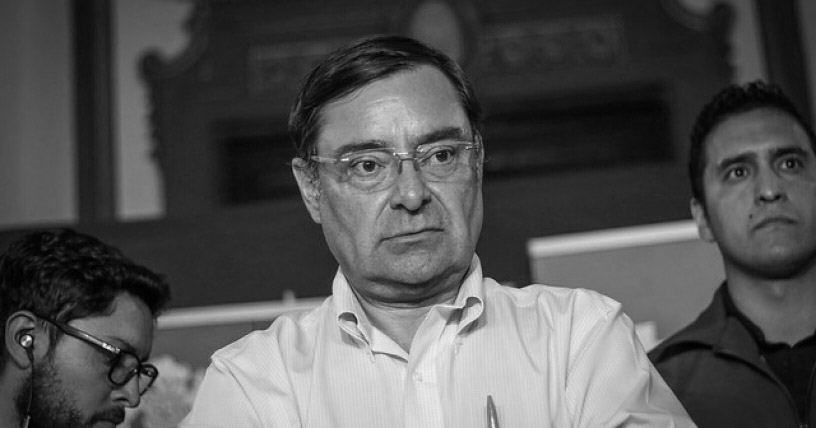
A court emphasizes that the Santiago Intendency (local government) should “from now on, protect, through police officers, the right to peaceful protesting”. See more
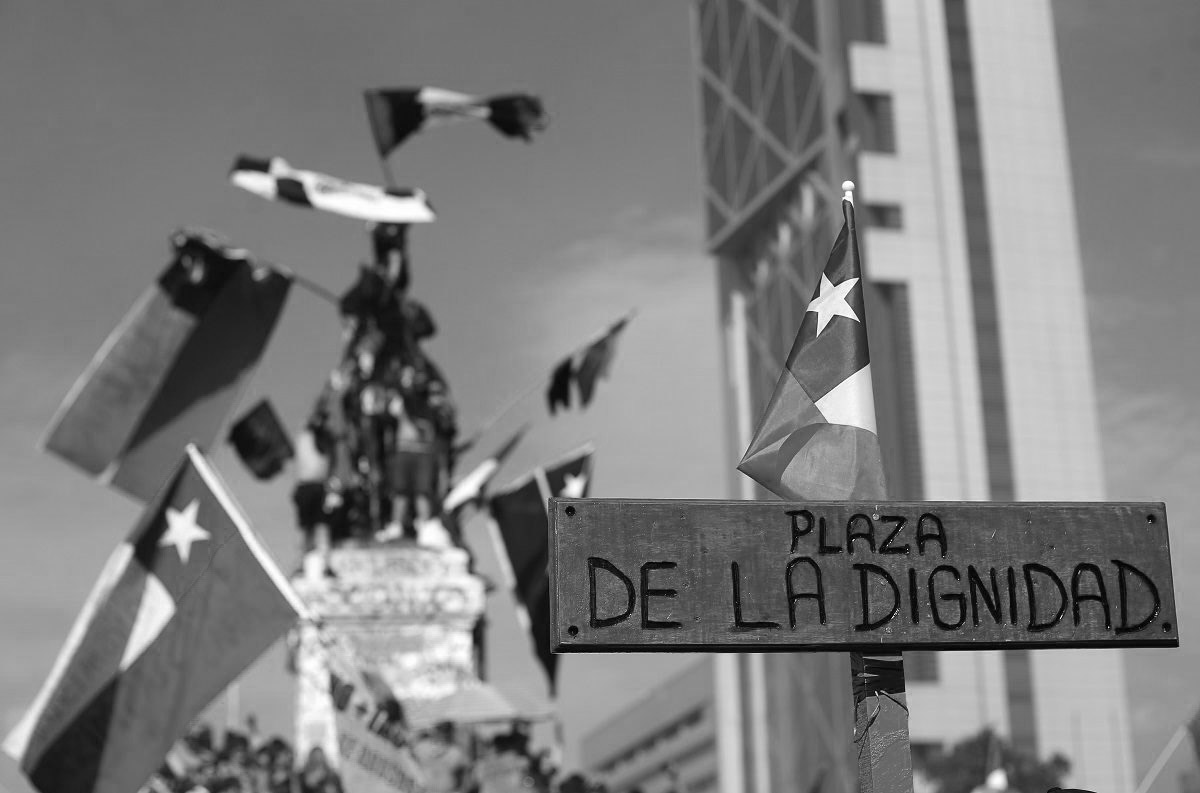
Thousands of people arrive at the ex-Plaza Italia (now popularly known as Plaza Dignidad) to celebrate a “New Year with Dignity”. There are no riots or violent situations. See more